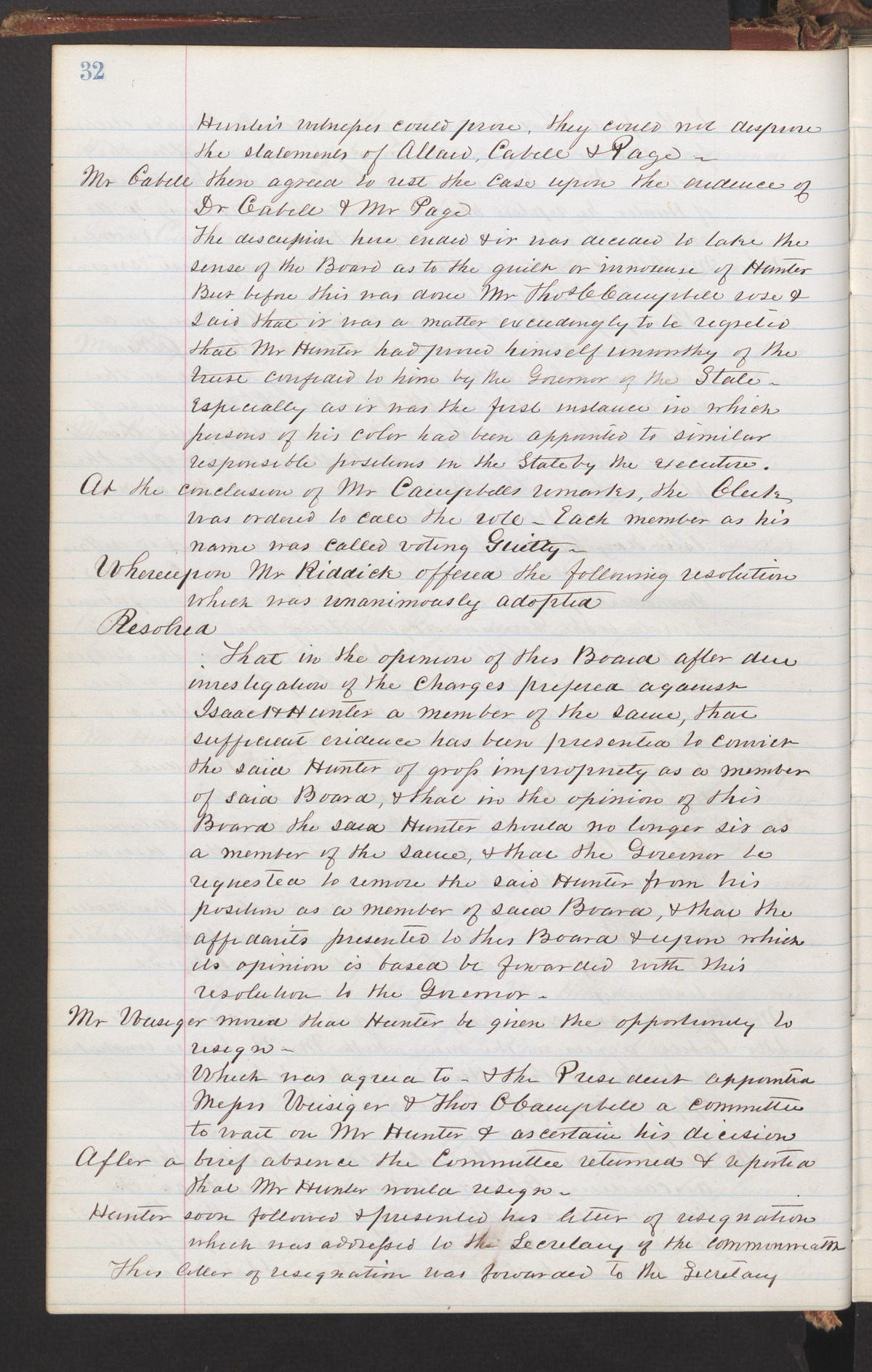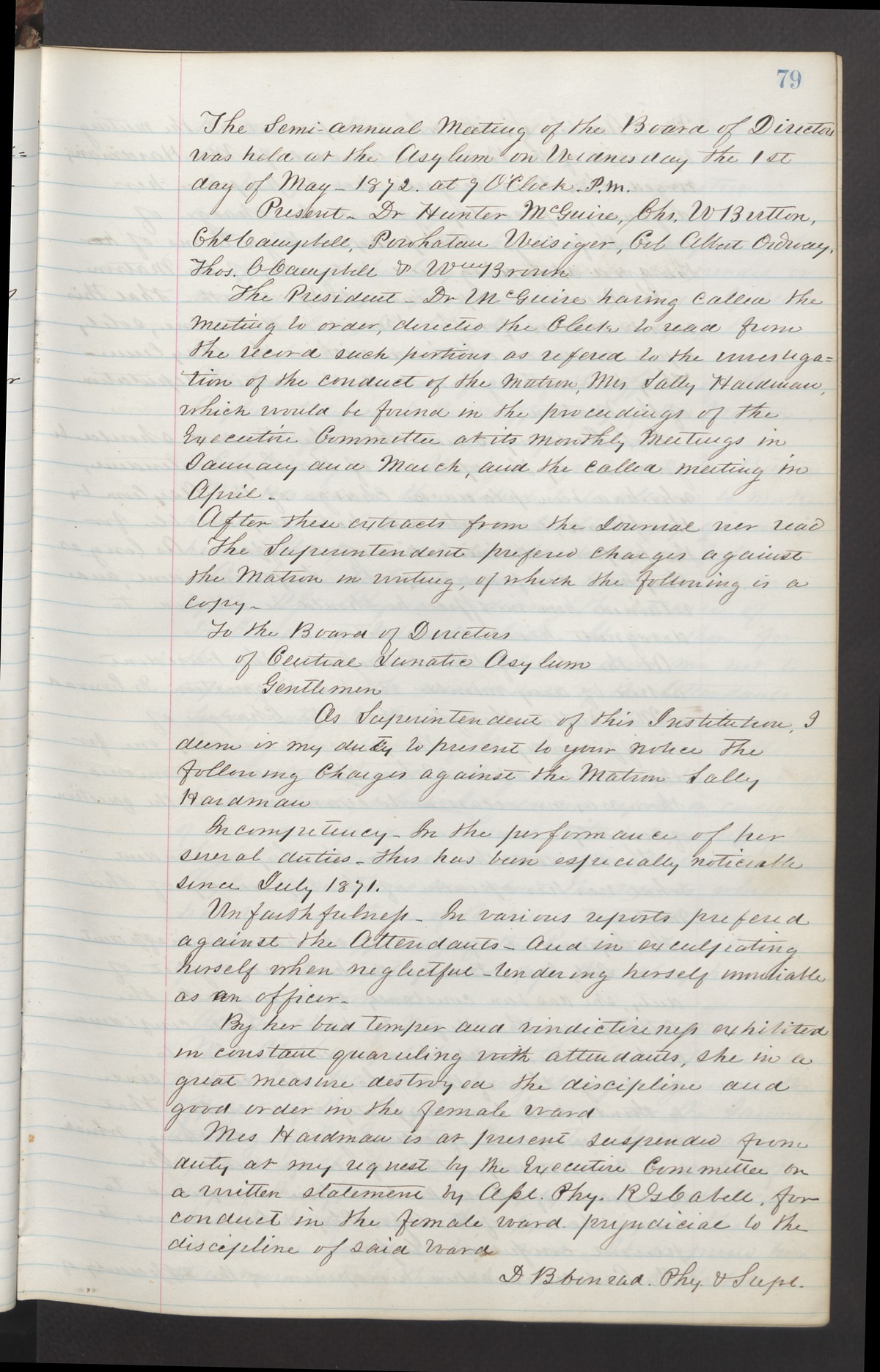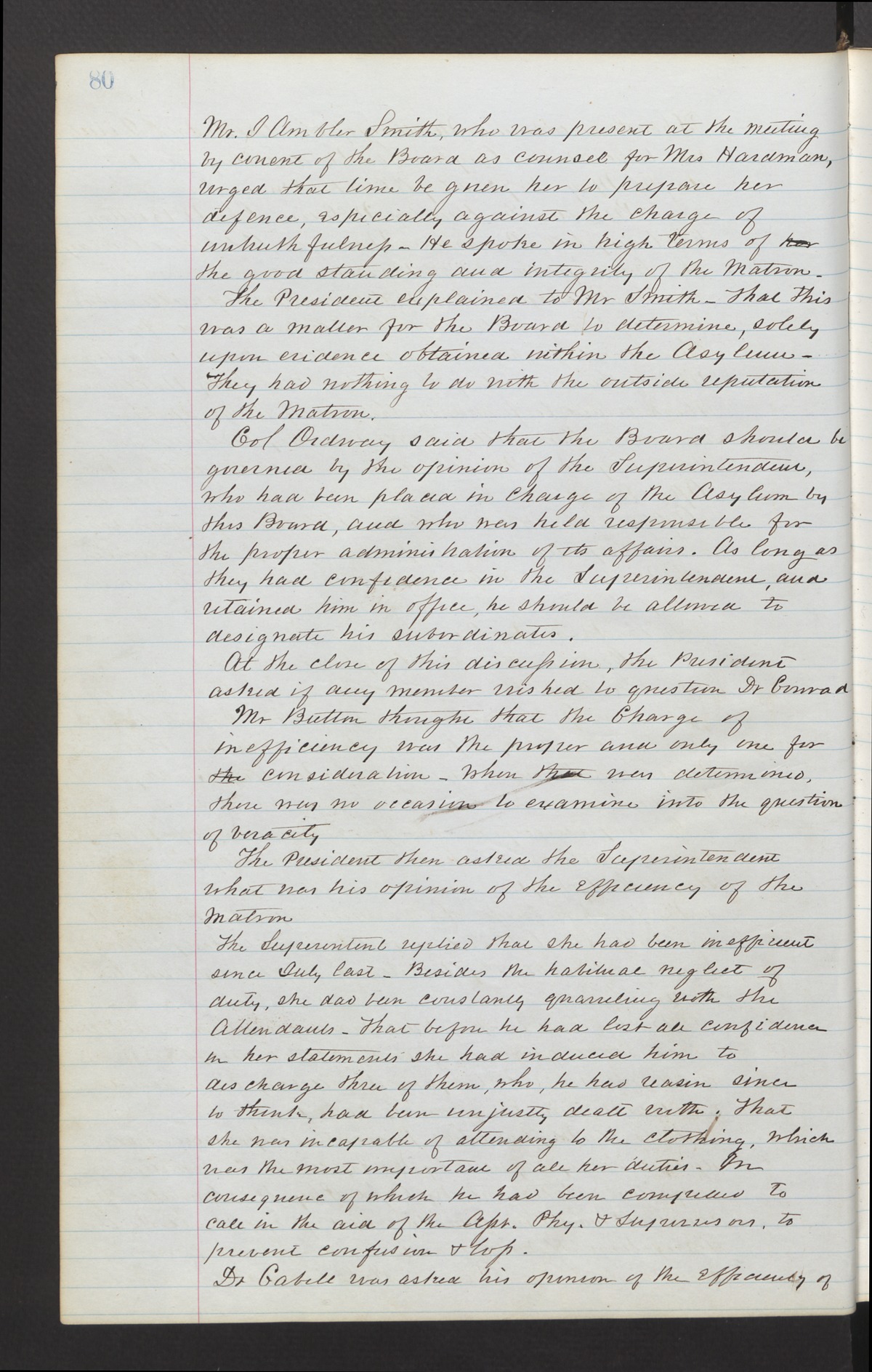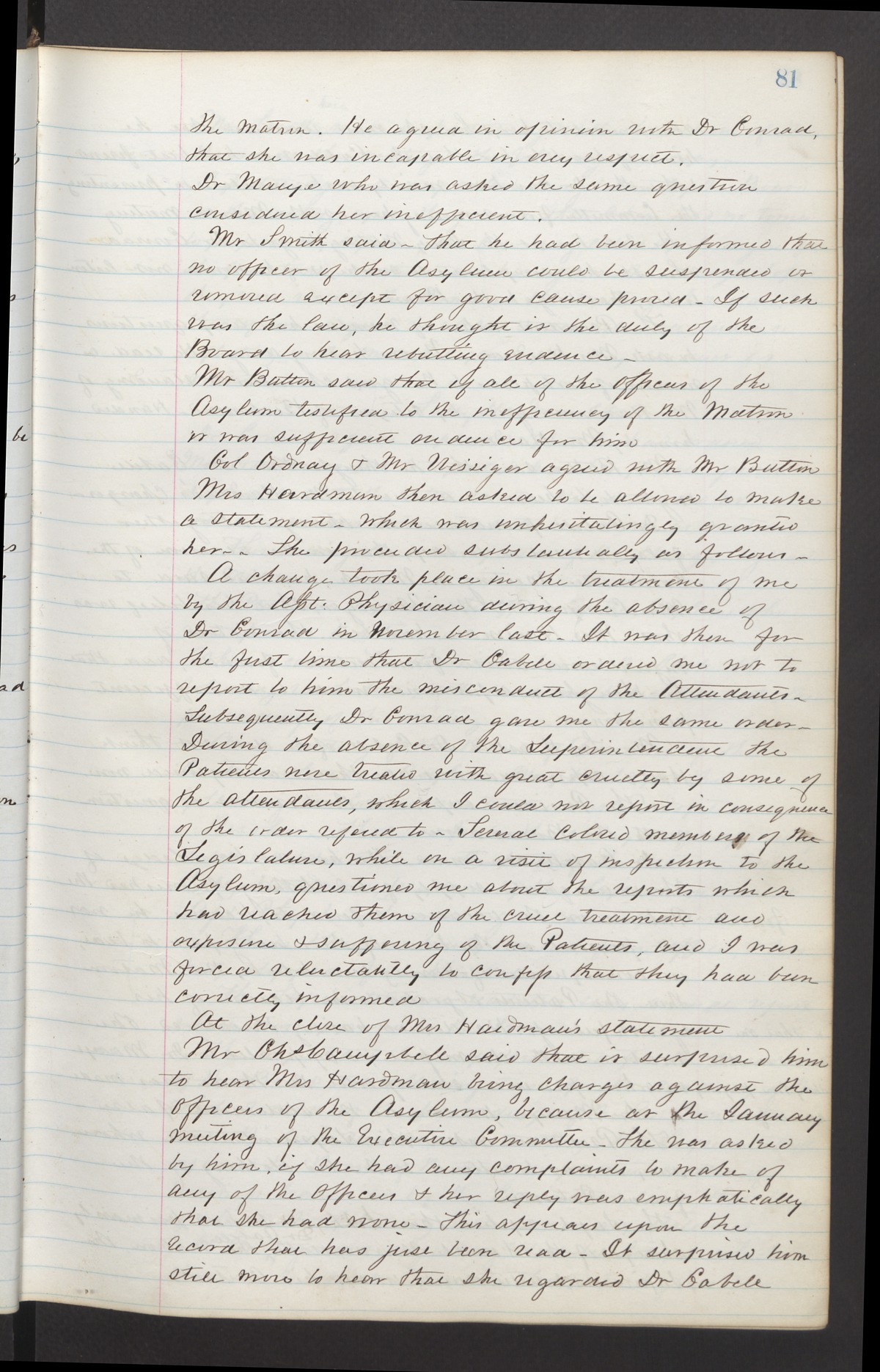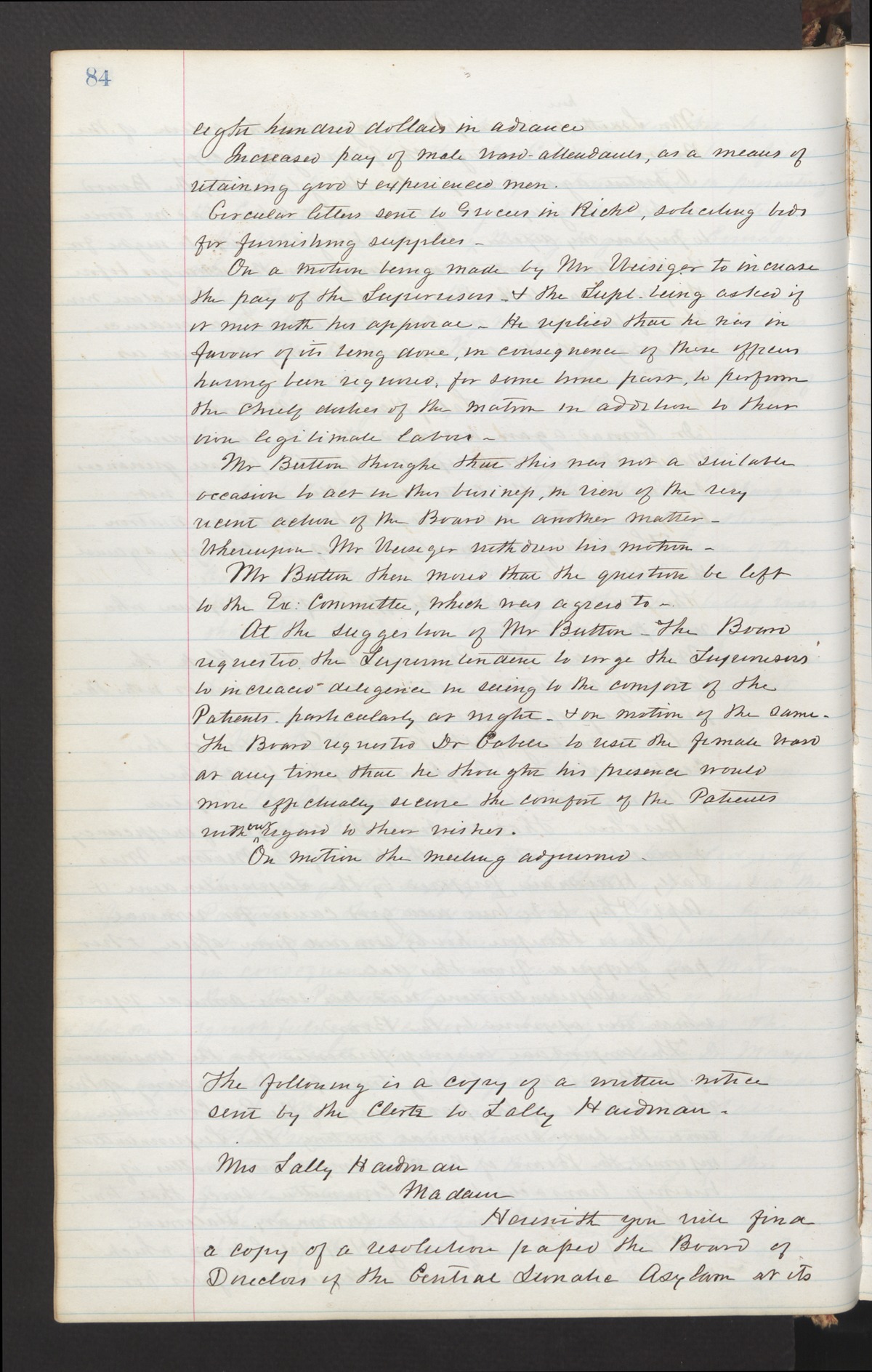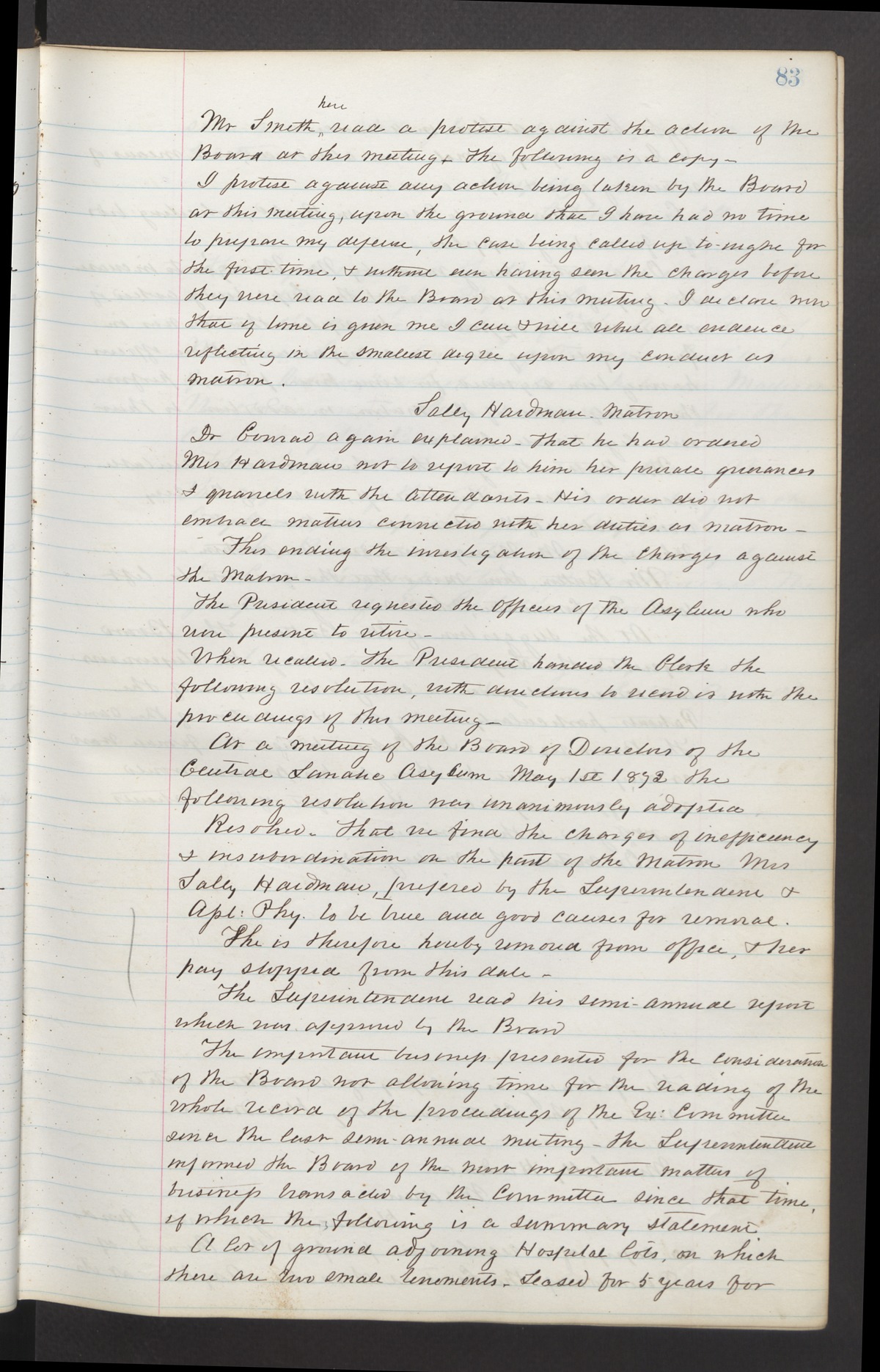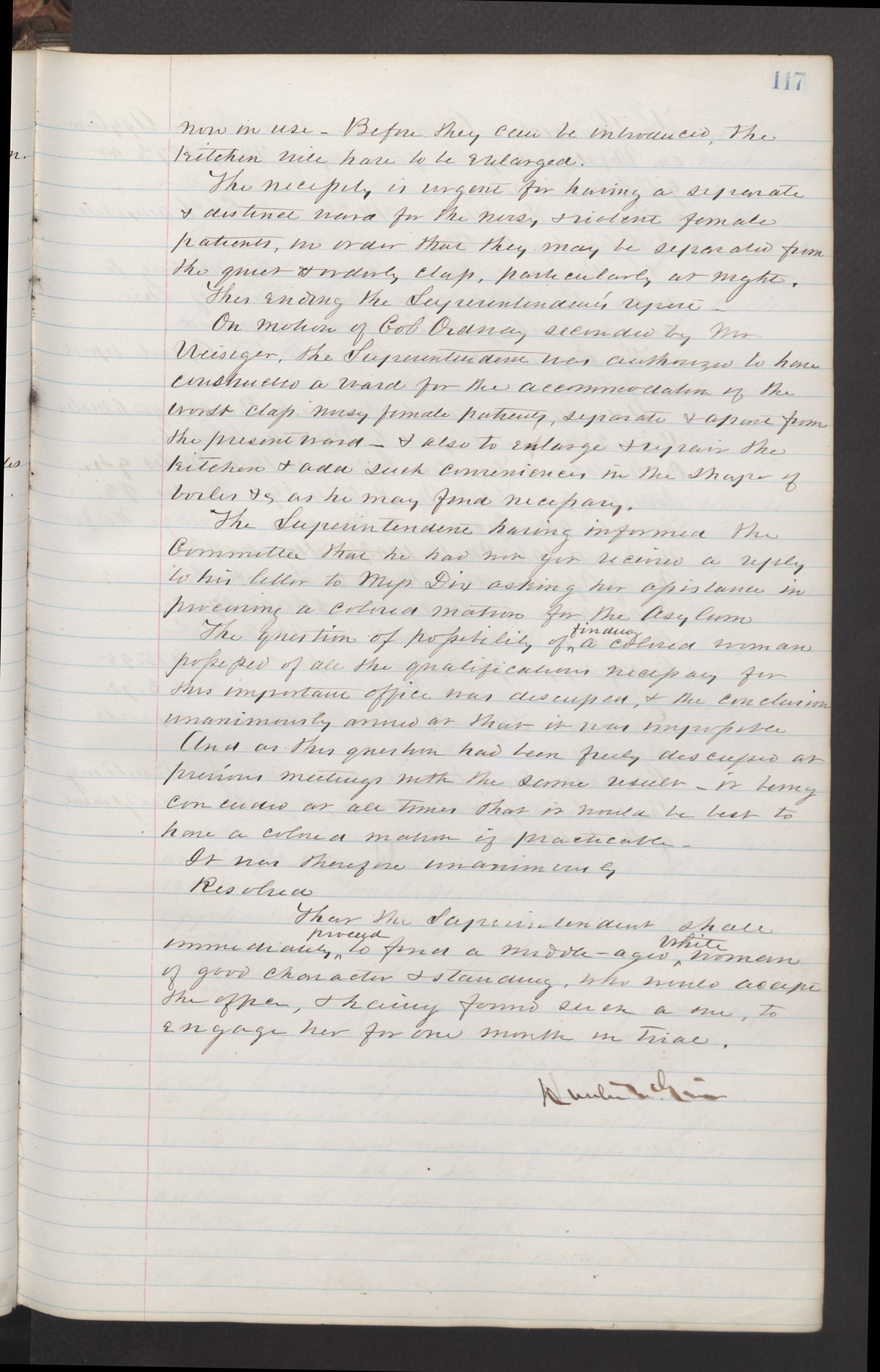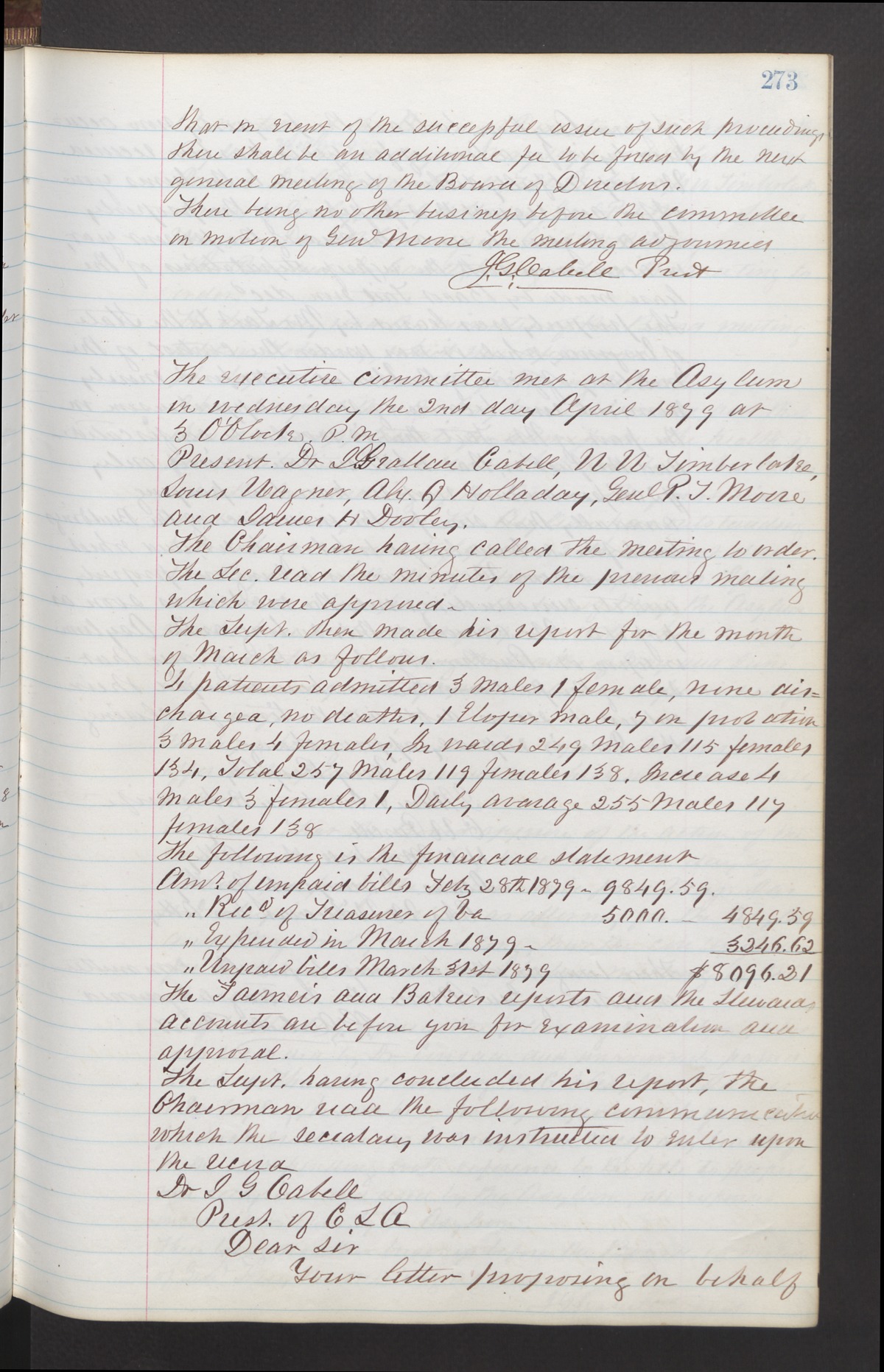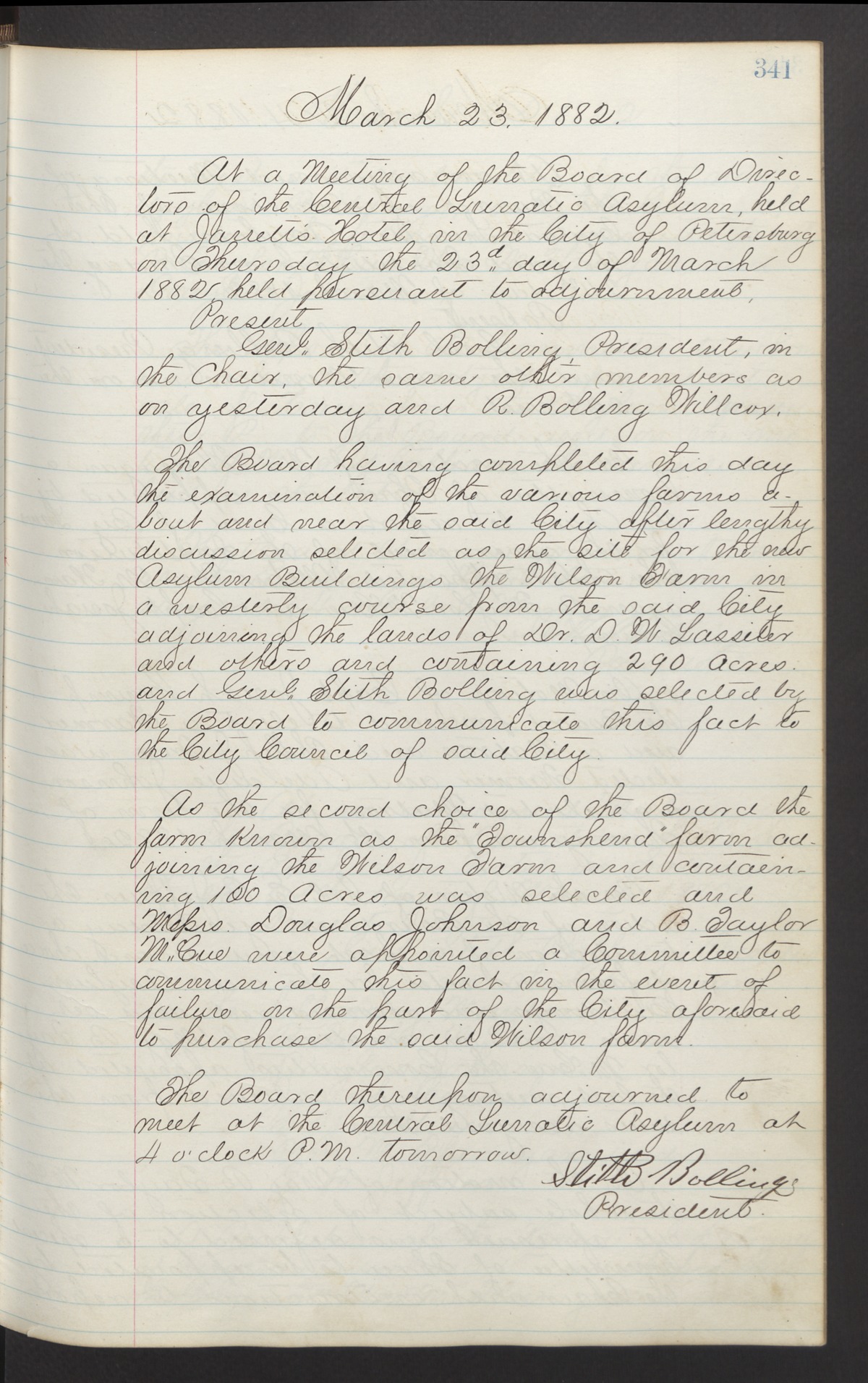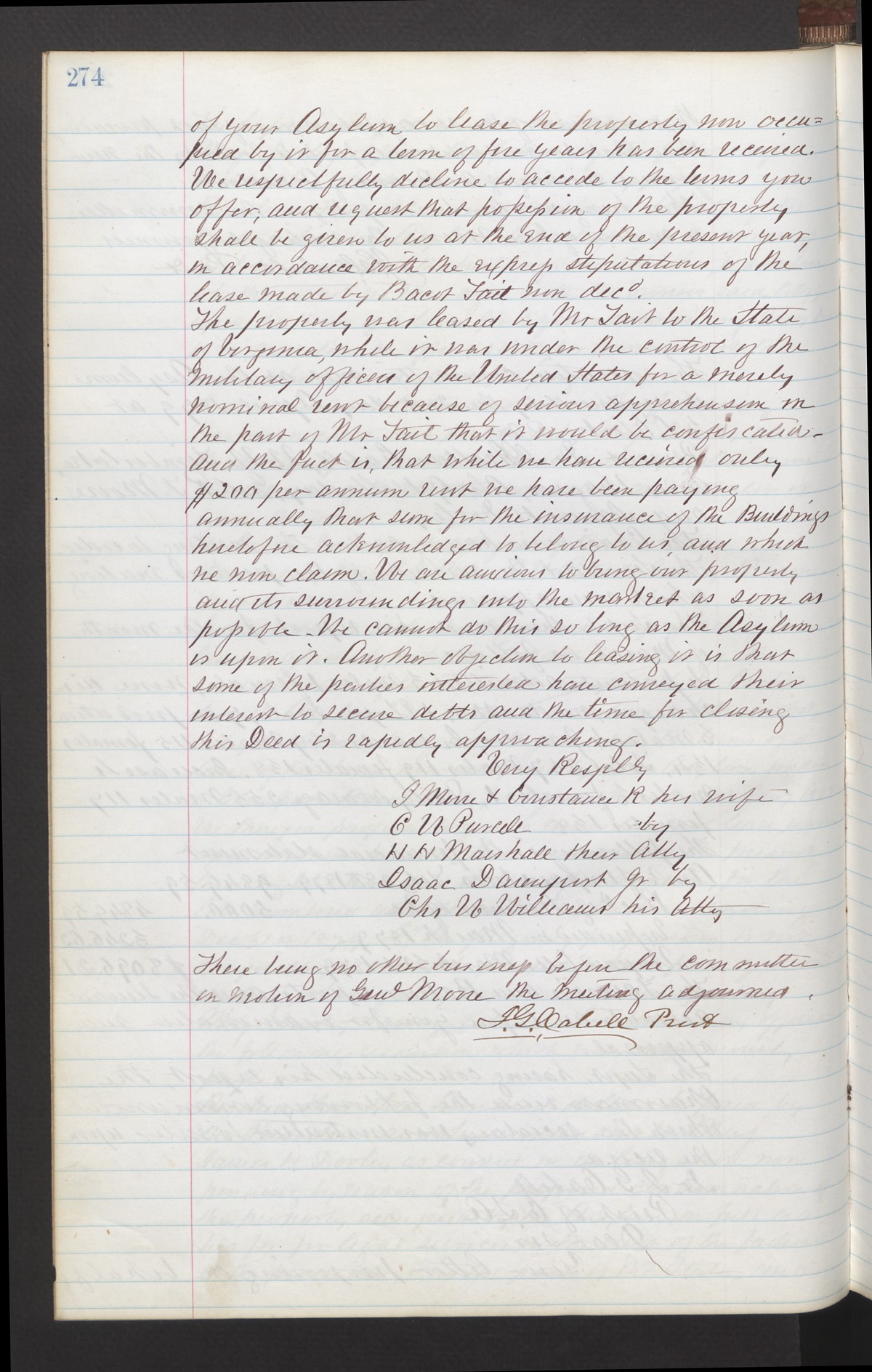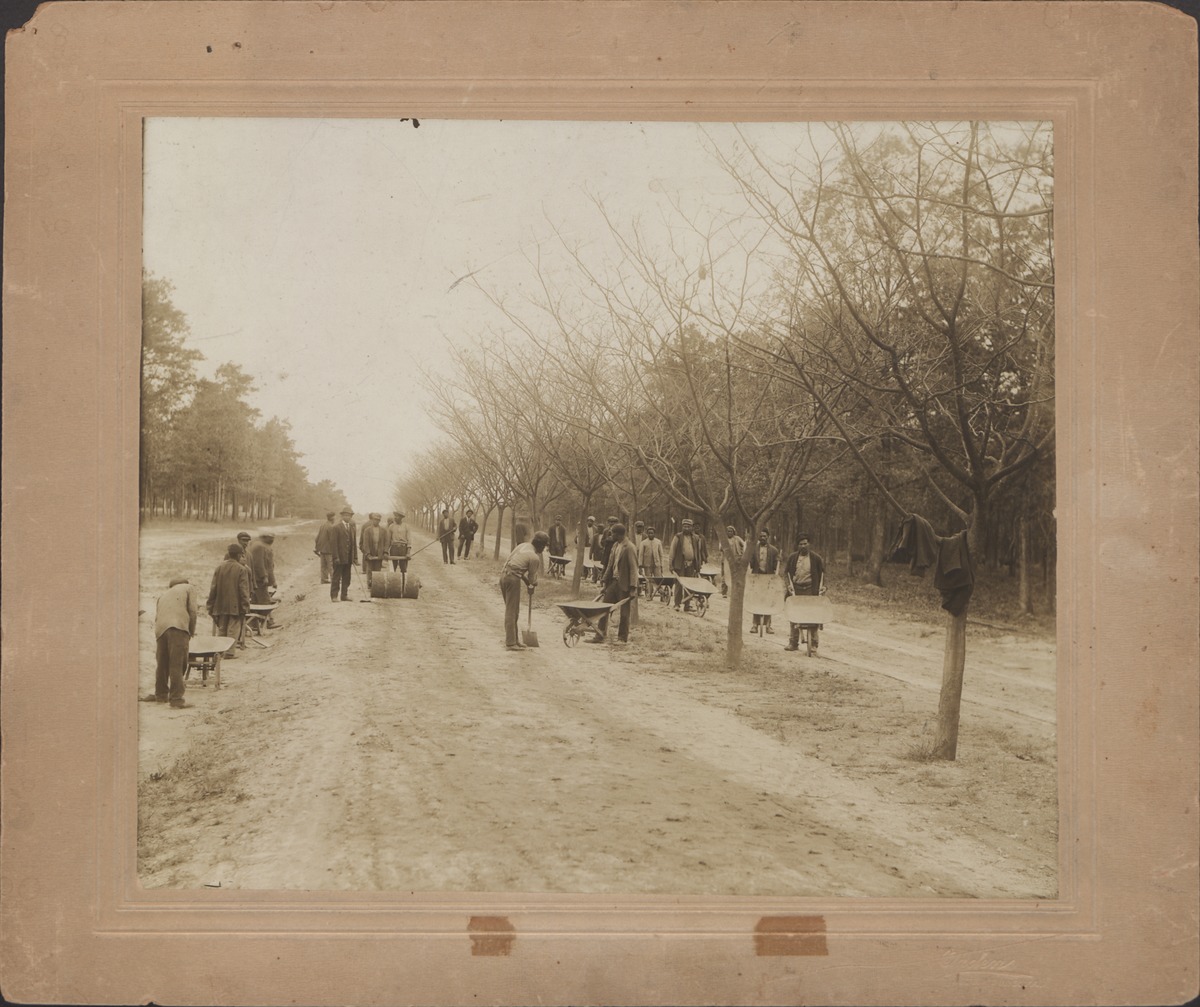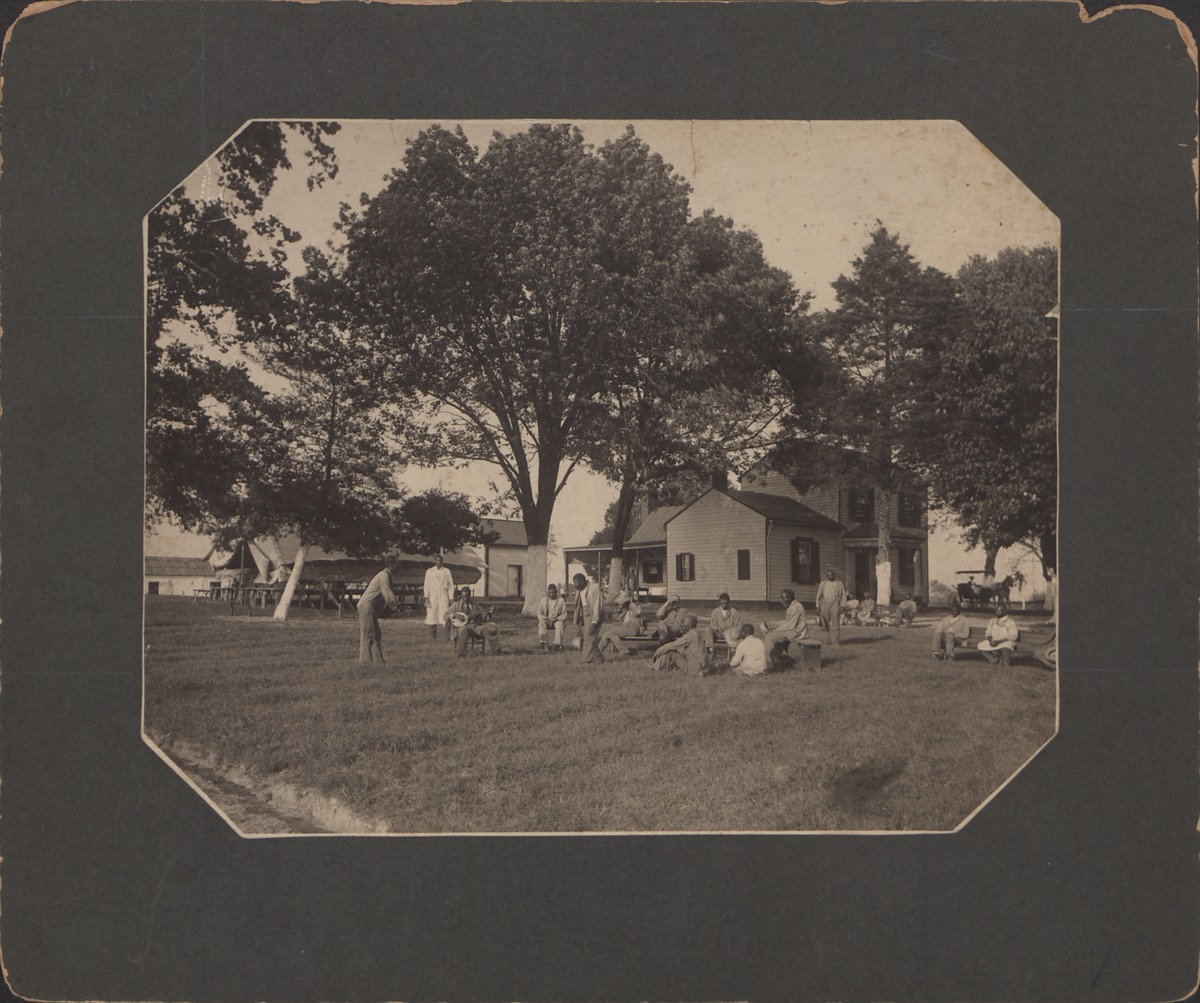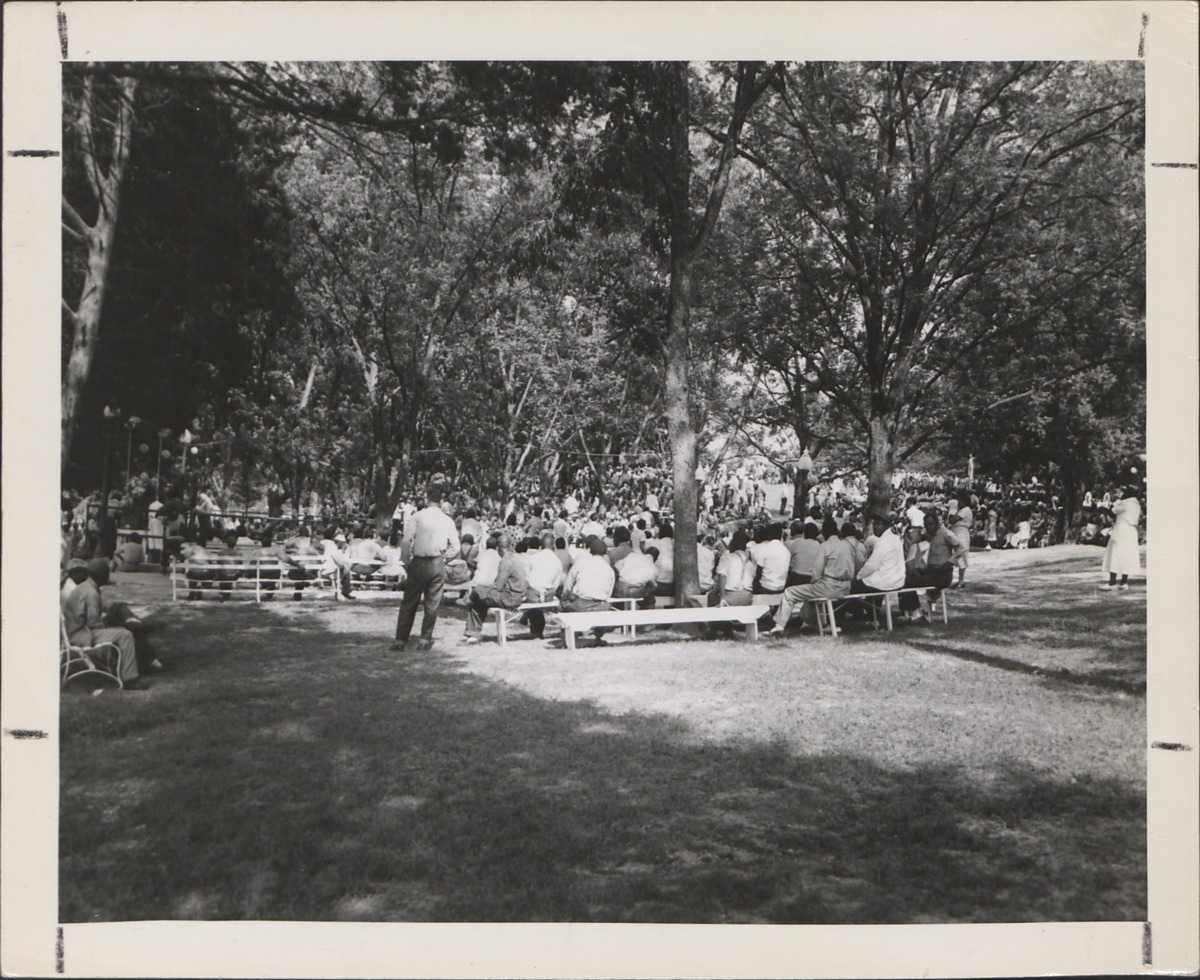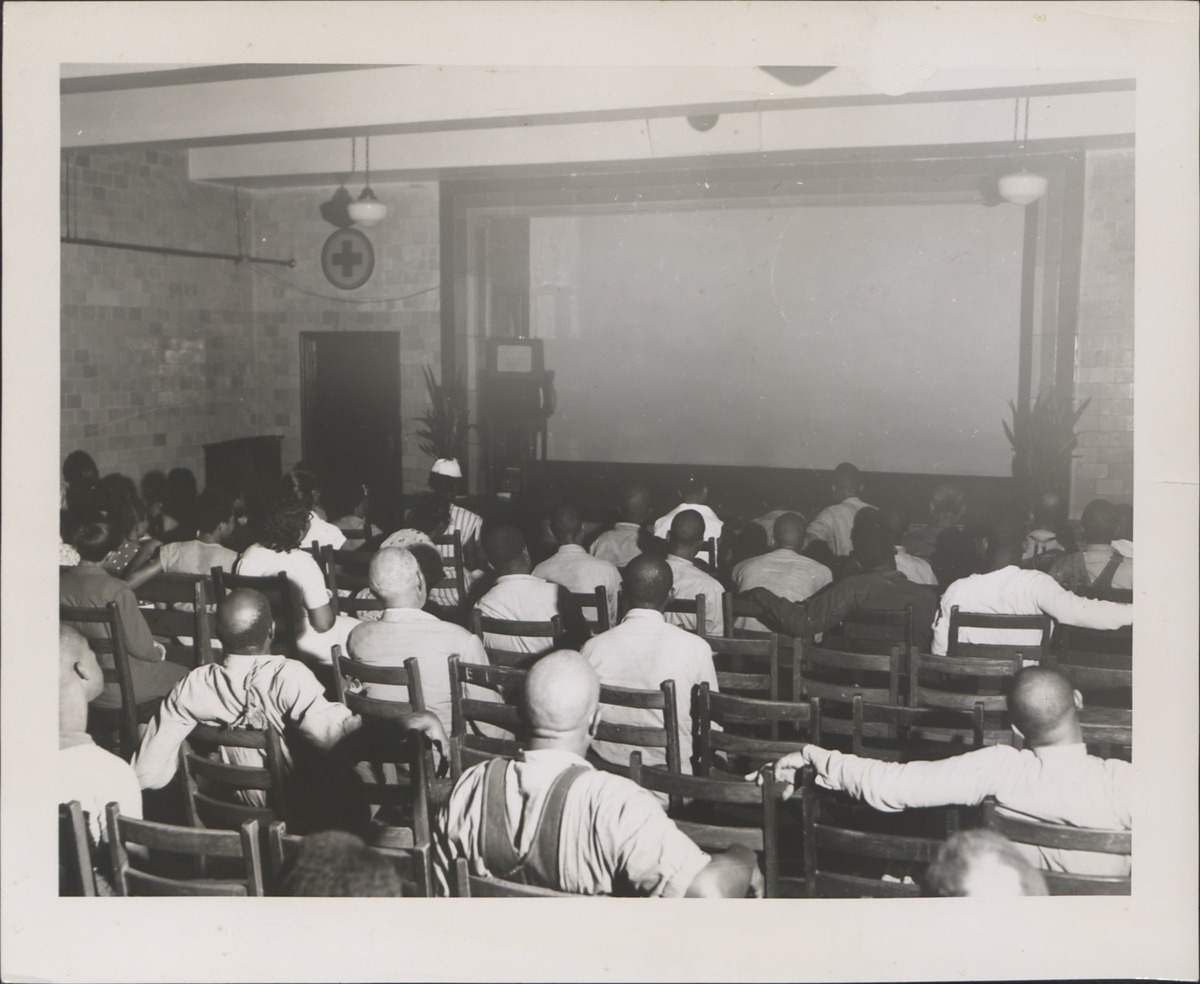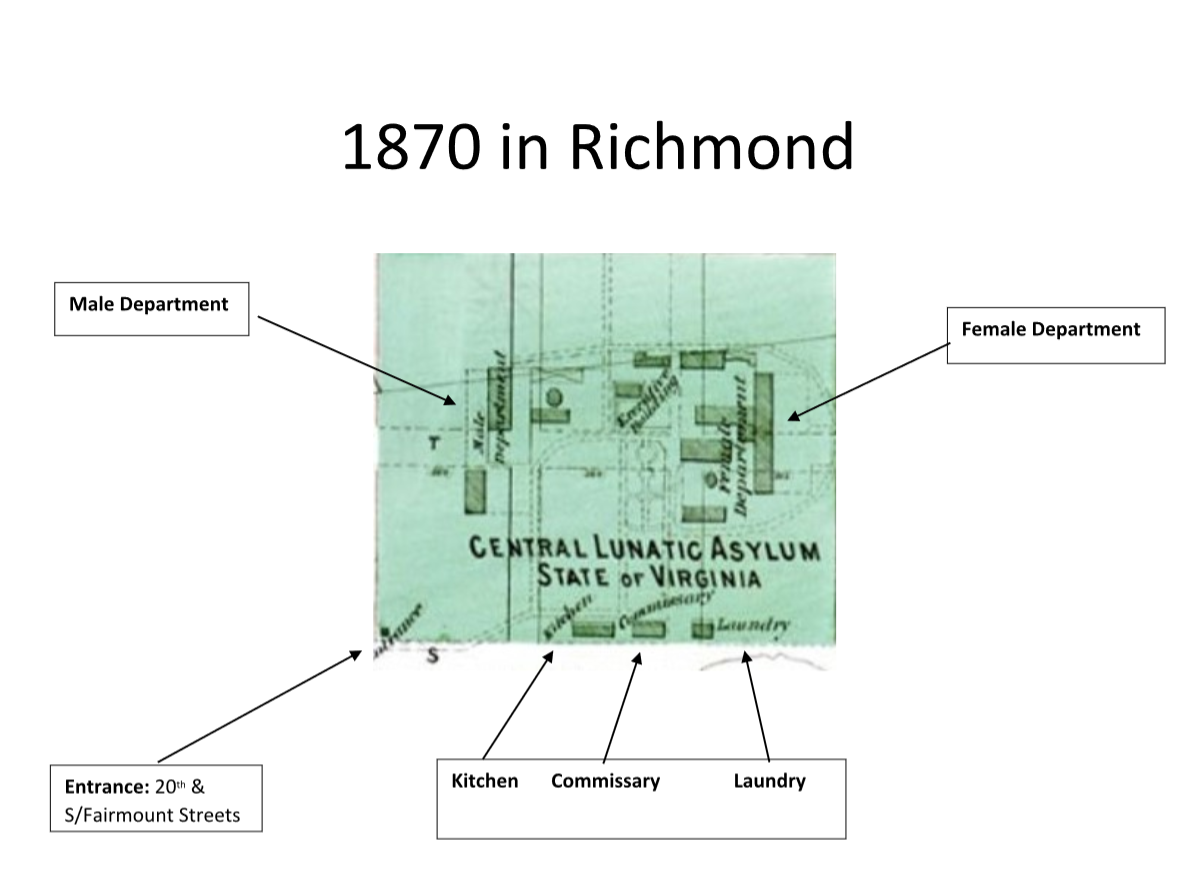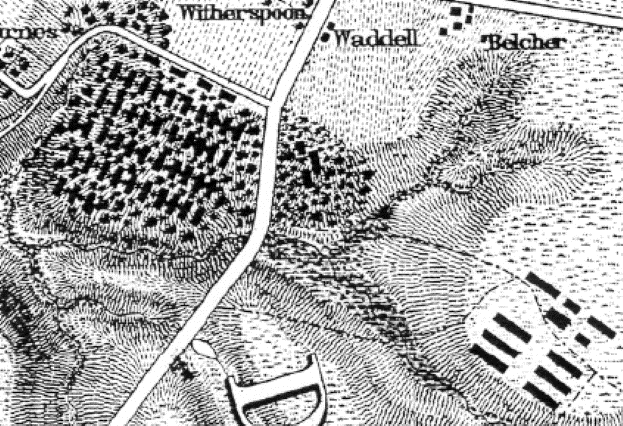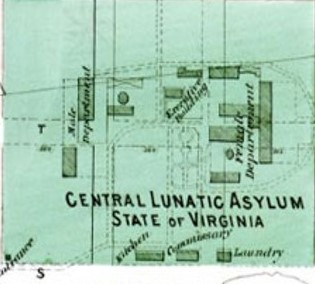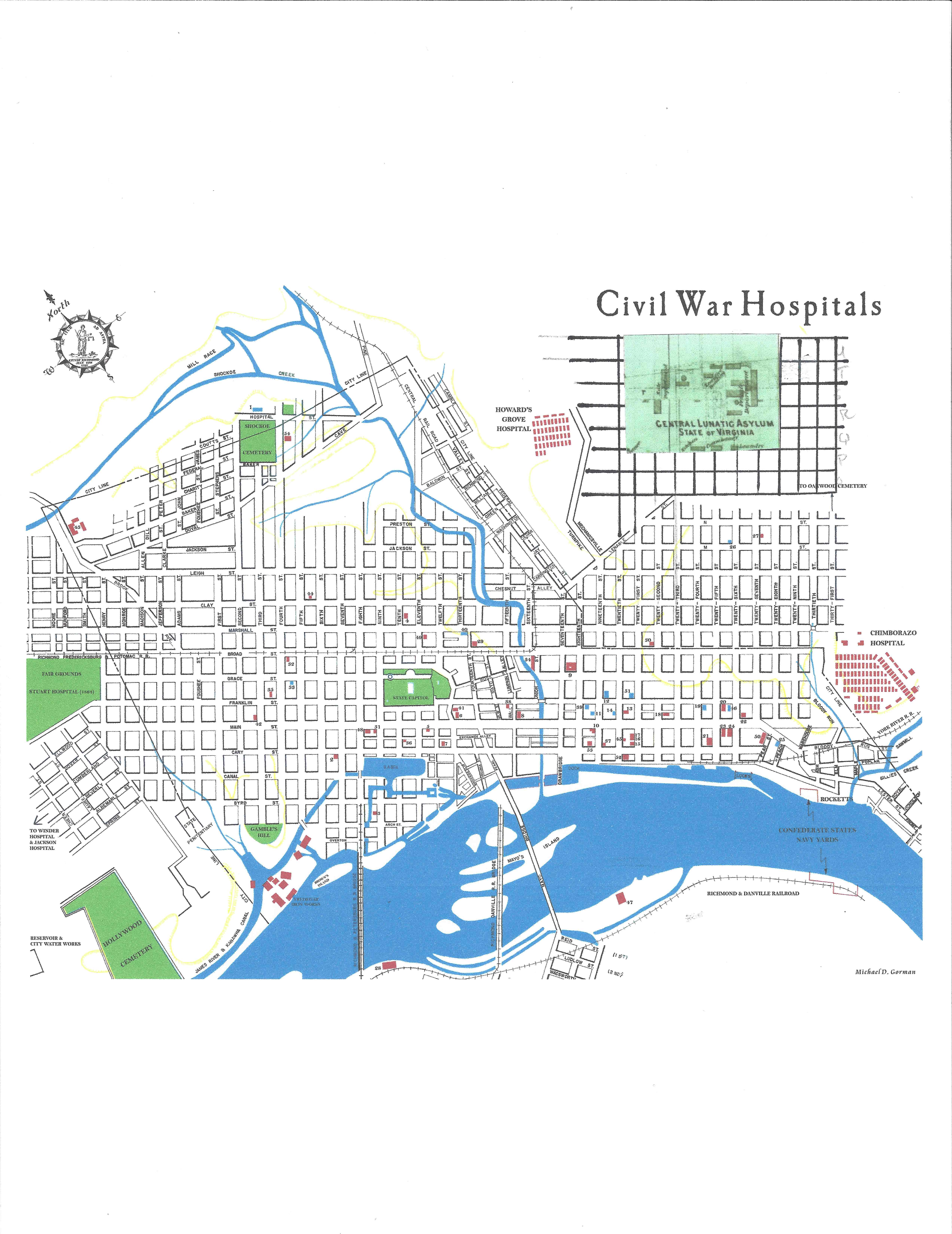The Founding and Early Years of the Central Lunatic Asylum for the Colored Insane
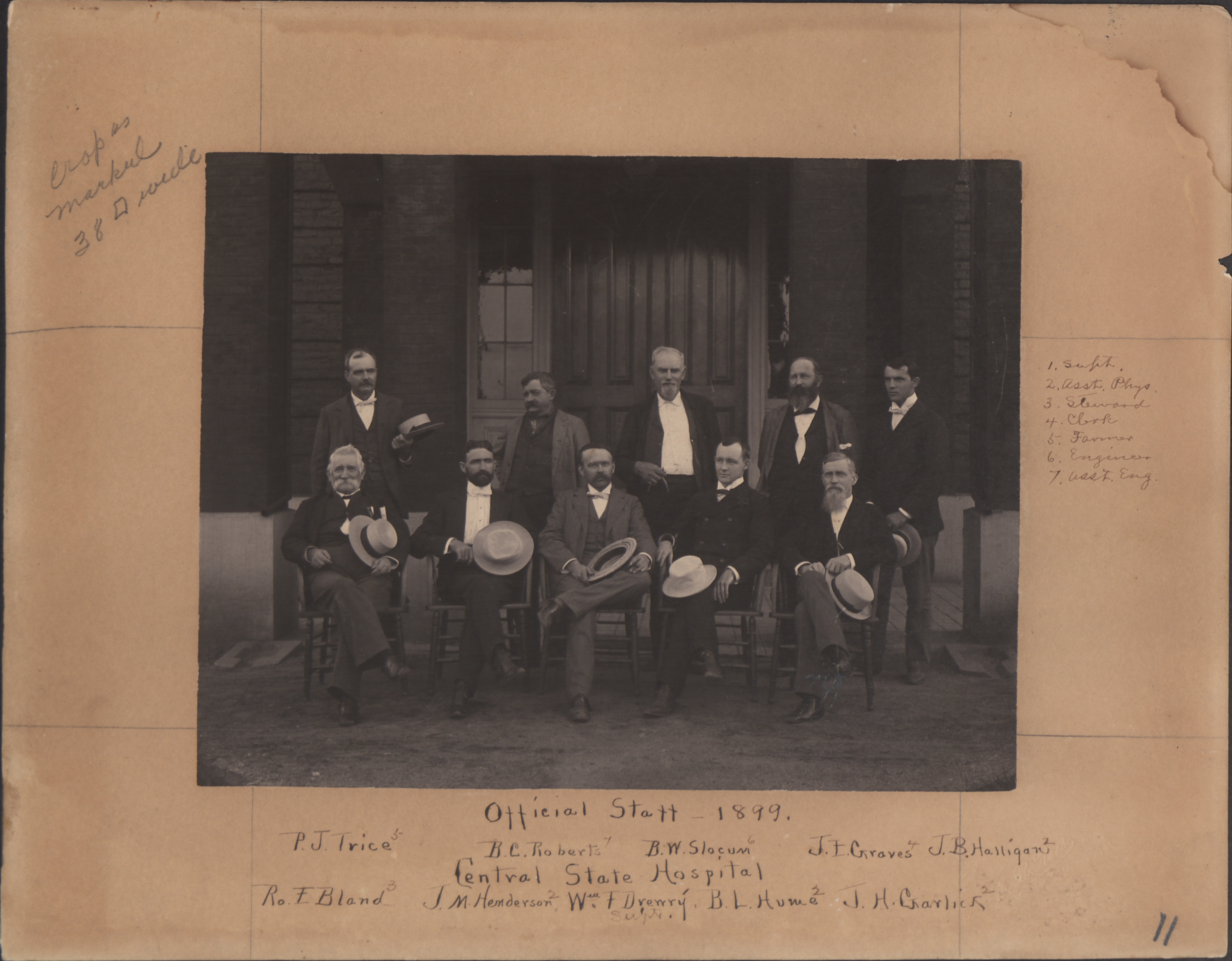
This digital exhibit is a journey into how Virginia became the first state to develop and operate a mental institution, either public or private, in the United States that was exclusively for people of African descent.
The focus of the exhibit is to provide an overview of the century-long social and political mechanisms that helped shape the creation of the Central Lunatic Asylum for the Colored Insane, which later became Central State Hospital. Then, the exhibit will present the early years of the hospital in the latter half of the 19th century, with a focus on the hospital’s impact on its institutionalized population and the surrounding community of Petersburg, Virginia.
This exhibit also showcases for the first time several documents and photographs from the Central State Hospital Digital Library and Archives. These digitized images are just a few of the over 800,000 digital scans that the project has produced so far.
Treatment of Mental Illness Among Blacks Prior to the Civil War
In two speeches to the Virginia House of Burgesses in 1766 and 1767, Francis Fauquier, who was serving as colonial Virginia’s Royal Governor (1758-1768), strongly urged for the creation of a hospital to care for the “poor lunatics.” While Fauquier died in 1768, his speeches did lead to the creation of a facility called the Public Hospital for Persons of Insane and Disordered Minds in Williamsburg in 1773. This hospital admitted free blacks.
John Galt was appointed superintendent of what was then called the Eastern Lunatic Asylum in Williamsburg in 1841. In 1846, Galt gained legislative approval for slaves to be admitted in addition to free blacks. The state law permitted admission of enslaved individuals so long as the slave owners could guarantee payment for their care (15, Acts of the Assembly, 1846). Galt practiced moral management therapy, which disapproved of using restraints on patients. It should be noted that while Galt believed in treating individuals regardless of race, the hospital dd own dozens of slaves.
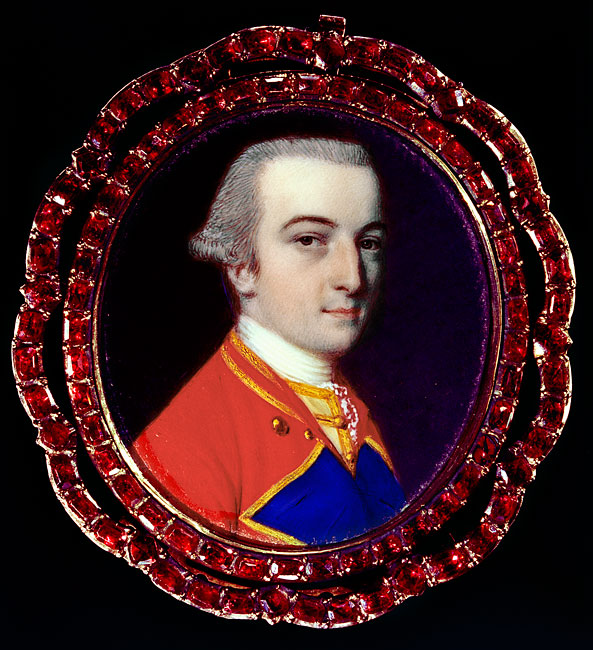
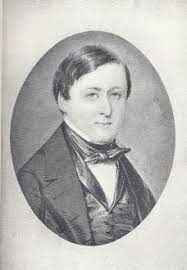
Post-Civil War
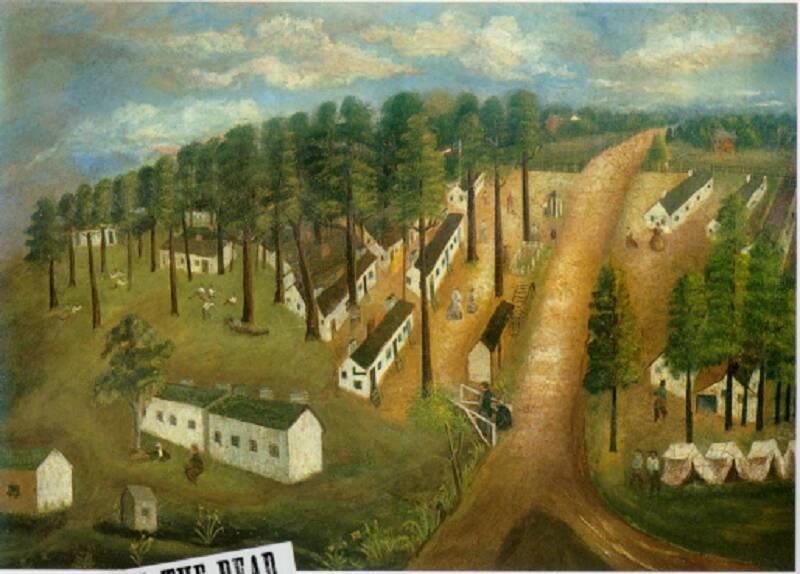
The first mental institution for African Americans was established 1868 at Howard’s Grove, the site of a former Confederate hospital in Richmond. During the war, the hospital could accommodate almost 2,000 soldiers.
Abraham Lincoln initiated the bill that Congress would pass in 1865 to create the Freedmen’s Bureau to help former slaves (as well as poor whites) in the aftermath of the Civil War by providing medical care, shelter, food, etc. The Bureau, which was chronically underfunded and constantly hindered by Southern “Black Codes” and groups such as the Ku Klux Klan, only lasted until 1872.
Freedmen’s Bureau Acts of 1865 and 1866
Also, less idealistically, these facilities rose from the Commonwealth’s intent to continue its precedent of racially segregated public services. Other southern states used the Virginia legislation to create similar laws and mental institutions segregated by race. The majority of these mental institutions in the South remained racially segregated until the Civil Rights Act of 1964 that required desegregation in order to receive federal funding reimbursements.
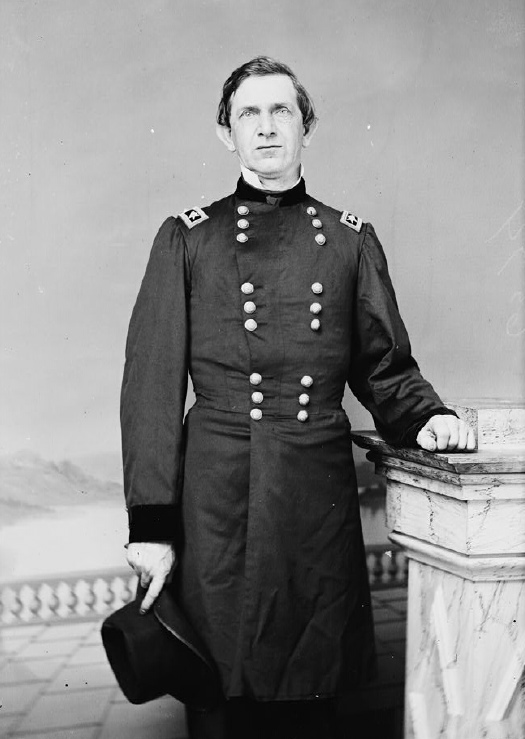
On December 17, 1869, Union General Edward Canby, who was the Military Governor of Virginia at the time, declared that the hospital at Howard’s Grove would serve exclusively as an asylum for blacks. His order established that the building would be turned over to the state of Virginia and the land, which belonged to the prolific slave-trader and jailer, Bacon Tait, would be leased for 10 years. Furthermore, all black mental patients held at the Eastern Lunatic Asylum and in Virginia jails would be transferred to the Howard’s Grove facility.
State Control
VA legislation assumed state control of the hospital in 1870 and the facility became the Central Lunatic Asylum for the Colored Insane (CLACI). The hospital would be renamed Central State Hospital in 1900.
Virginia Acts of Assembly – Chapter 146 (approved June 7, 1870)
The hospital accepted African American patients from throughout the Commonwealth of Virginia.
A major supporter of CLACI in its early years was the Readjuster Party, a biracial coalition in Virginia that rose to prominence in the early 1870s under the leadership of former Confederate General William Mahone. The party was named so because its followers believed in readjusting the state’s prewar debt owed to Northern banks. It also ascribed to increasing funding for public facilities and repealing a poll tax that prevented blacks from voting. Notably, former Petersburg mayor William Cameron, successfully ran for governor as a Readjuster and served from 1882 to 1886.
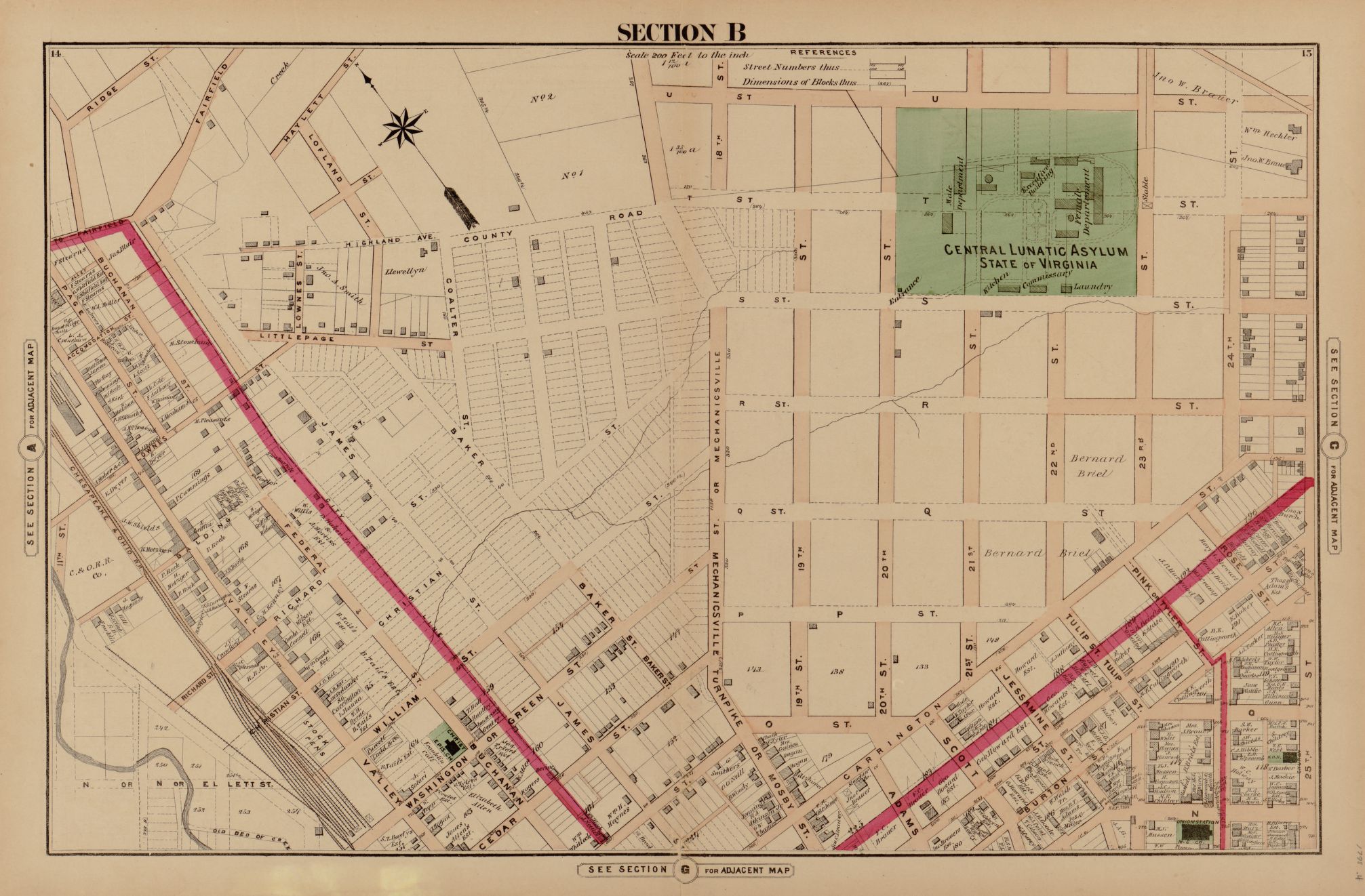
June 15, 1870: The first regular meeting of the Board of Directors of The Central Lunatic Asylum
Read the Transcript
Lunatic Asylum was held at the Asylum Richmond Virginia on Wednesday
June 13th 1870 at twelve o clock. Present, Dr. Hunter McGuire, Charles Campbell,
Powhatan Weisiger, William H. Payne, Isaac H. Hunter, J Caskie Cabell,
W.L. Riddick, James Tyler, and Thomas C. Campbell.
On motion of Mr. Weisiger Mr. Charles Campbell, was elected tempo-
rary Chairman.
On motion of Mr. Riddick, Isaac H. Hunter, was elected temporary Secretary.
The meeting was called to order by the Chairman who stated
that the first business in order was the election of perma-
nent officers, whereupon Mr. Weisiger nominated for perma-
nent President Dr. Hunter McGuire who was unanimously
elected.
Mr. Cabell nominated for permanent Secretary Isaac H. Hunter
who was also unanimously elected.
On motion of Mr. Weisiger the rules and regulations of the Western
Lunatic Asylum, so far as applicable to this Central Lunatic
Asylum, was adopted.
At the request of General Payne the President read the Bylaws of the Western
Lunatic Asylum. After which General Payne moved to proceed
to the election of an Executive Committee. adopted
On motion of Mr. Riddick Messrs Charles Campbell, Weisiger, and Hunter
were elected the Executive Committee. Dr. Hunter McGuire Ex-
officio (President)
Mr. Riddick suggested that the salary of officers of the asylum be fixed
before the Directors proceed to elect them, and upon his
motion, the question of officers salaries was then taken up.
General Payne moved that the salary of Surgeon in charge be fixed at
Three $3,000 Thousand dollars per annum without commutation.
Mr. Charles Campbell said that he thought that the Director should use all
the economy possible, and moved to amend by inserting
two thousand five hundred dollars, with a house provided instead
of three thousand dollars, in advocacy of his amendment, he said
that the Surgeon in charge would have an opportunity to attend
patients outside of the asylum, and thereby realize an addition
means of support.
Mr. Thomas C. Campbell inquired if the rules of the “Eastern and Western Asylums
did not require that the Surgeon’s in charge should devote this whole
time and practice to their respective institutions?” The President said that
he thought that such should be the case. There being some doubt
existing in the minds of the directors in relation to the matter.
Mr. I. H. Hunter offered the following resolution which was unanimously –
————Page 2/5————
adopted, Resolved, that the time and attention of the Superintendent
of the Central Lunatic Asylum shall be exclusively
devoted to demands and necessities of the Institution.
Mr. Charles Campbell, renewed his motion, in relation to the salary of Superintendent
but, there being no second to it, his motion was lost.
Mr. Weisiger, offered the following resolution which was unanimously adopted;
Resolved; that the Physician and Superintendent be allowed
Three Thousand dollars in lieu of all compensation for his
services.
On motion of Mr. Weisiger, it was Resolved; That there shall be one assistant
Physician at the Central Lunatic Asylum.
Mr. Riddick moved that the pay of Assistant Physician be Twelve hundred dollars
per annum and commutation, and that he be required to reside at
the Institution. adopted.
At the request of General Payne, the President read the duties of Steward.
Mr. Riddick moved that the salary of Steward be fixed
at Nine hundred dollars. The amendment of Mr. Hunter
was accepted, and the motion, adopted.
The President, then read the duties of Matron.
Mr. Riddick moved that the salary of Matron be fixed at
Five hundred dollars per annum with commutation. adopted.
Mr. Weisiger, moved that the salary of Treasurer be fixed at Five hundred
dollars per annum and that he be required to deposit
the funds of the asylum in the “State Bank of Virginia”
Unanimously adopted.
Mr. Cabell offered the following Resolution which was adopted. Resolved,
That the Clerk to the Central Lunatic Asylum shall
received Four hundred dollars per annum and commutation
Mr. Riddick offered the following Resolution which was adopted,
Resolved; that the
Executive Committee be authorized to employ when they deem
it necessary A Gardener at a salary ____ Watchmen,
Baker, _____ Cook, _____ Oster, ____, and such male, and
Female Servants as the Central Lunatic Asylum may need.
Mr. Weisiger offered the following resolution, which was adopted
Resolved that the Employees
of the Central Lunatic Asylum be paid respectively the following
salaries, excluding commutation, Gardener, $30.00 per month, Watchmen,
$35.00 per month, Cook, $20.00, Baker, 35-, Chief Male Servant, $18; Chief Female
Servant, $15, Other Male Servants, $15, Other Female Servants, $10; Oster, $15;
————Page 3/5————
On motion of Mr. Riddick the Board then proceeded to the election
of officers (in their regular order) and the applications
of the following gentlemen were presented for the positon
of Superintendent. Drs. D H. Tucker, G W. Harris, J G.
Sumpkin, T.V.L. Davis, J LeVert Powell, I.H. White,
Edward C. Fisher, L.A.Woolson, D.B. Conrad and
C.W.P Brock.
Mr. Cabell nominated for Superintendent – Dr. Isaiah H. White
MR. Riddick nominated “ “ “ C.W.P. Brock
Mr. Thomas C. Campbell, nominated “ “ D.B. Conrad There being no other
nominations the president directed the roll to be called which
resulted in Dr. D.B. Conrad receiving on the first vote five votes
Dr. C.W.P. Brock three votes and Dr. Isaiah H. White one vote
Whereupon Mr. Weisiger asked permission to change his vote to Conrad. Mr.
Cabell then moved that the Election of Dr. D.B. Conrad of Winchester
for Superintendent of the Central Lunatic Asylum be declared
unanimous – adopted.
The next election in order being that of Assistant Physician, the recomm-
endation of the following gentlemen were presented before the
Board. Drs. R.M. Harper, James F. Pendleton, and R.G.
Cabell Jr.
Mr. Weisiger, nominated for Assistant Physician Dr. R. G. Cabell Jr. and spoke
in the highest terms of his qualifications
Mr. Riddick, nominated Dr. R.M. Harper
Mr. Hunger, nominated Dr. J.F. Pendeton {
Mr. Weisiger asked if there were any
other candidates? Upon being informed by the president that the three
gentlemen whose names had been called were the only ones, he asked
that the roll be called, which resulted as follows: Dr. R.G. Cabell
Jr. seven, James F. Pendleton one, and Dr. R.M. Harper, one vote, whereupon
Dr. Cabell was declared elected, and on motion of General Payne his election
was declared unanimous.
On motion of Mr. Riddick the Board then proceeded to the election of Steward. The names
of Samuel B. Clarkson, Daniel Stephens and Thomas Lindsay were
presented
Mr. Hunter nominated Mr. Daniel Stephens and spoke in high terms of his very
peculiar qualifications to fill the position during the course of his
remarks he stated that he actually believed that under present
circumstances Mr. Stephens was the best person in the state for the
position and upon the roll being called the result was that Mr.
Stephens was unanimously elected.
The election of Treasurer being next in order, the following gentlemen’s recom-
mendations were presented – Mr. W.L. White, S.H. Pulliam, and E.
————Page 4/5————
G. Tompkins. Mr. Charles Campbell nominated Mr. E.G. Tompkins
Mr. Cabell nominated Mr. W.L. White and Mr. Riddick nominated
Mr. S.H. Pulliam then being no other nominations the –
President ordered the roll to be called with the following
result. Mr. W.L. White received seven votes, Mr. Tompkins
one and Mr. Pulliam one vote, whereupon Mr. White was
declared elected, and on motion of Mr. Riddick his election
was declared unanimous.
The next Election in order, being that of Matron, Mrs. Kelly, Mrs.
Lollner and Mrs. Sally Hardmann were each nominated
Mr. Hunter spoke in high terms of the qualifications of Mrs. Hardmann
and said that he hoped that it would be the pleasure of
the board to unanimously elect her. The President said
that he desired to add his testimony in behalf of the
peculiar qualifications of Mrs. Hardmann for this
position and there being no other nominates the President
ordered the roll to be called which resulted in the
unanimous election of Mrs. Sally Hardmann.
On motion of Mr. Riddick the bond of the Treasurer was then taken
up, and on motion General Payne the amount of bond was fixed
at Twenty five thousand dollars.
The next business was the amount of funds necessary to be appropriated
for the use of the asylum. After some discussion which
was participated in by Messrs Thomas C. Campbell, Cabeel,
Riddick, Payne, and Hunter at the suggestion of the
President Mr. Riddick offered the following resolution
which was adopted. Resolved,
That the General Assembly
be, and is, hereby most respectfully requested to appropriate
for the use of the Central Lunatic Asylum for the
present year. Fifty-Thousand dollars.
The President then stated that as some of the officers had perfected
their arrangements to remain at the Central Lunatic Asylum
until the first of July he hoped that the Board would make
the term of the new officers to commence on the first day
of July next whereupon Mr. Riddick offered the following
Resolution which was adopted
Resolved, that the official
term of the newly elected officers of the Central Lunatic Asylum
shall commence on the first day of July 1870, unless it shall be
deemed necessary to sooner require their services, by the Board of
directors
————Page 5/5————
On motion of Mr. Wesiger the following resolution, was adopted,
Resolved; that if the Superintendent, and Executive
Committee shall deem it necessary, a clerk shall
be appointed to the Central Lunatic Asylum at a
salary not exceeding Four Hundred dollars per annum
with commutation.
The President stated that thought that the Present Surgeon in
charge deserves great credit for the neat and good
condition of the Central Lunatic Asylum, and that
he thought it due to Dr. DeLamater and his subor-
dinate officials that the Board of directors should express
their appreciation of the able manner in which the Insti-
tution has been conducted and therefore offered the
following resolution which was unanimously adopted
Resolved;
That we desire to express our approval of Dr. DeLamater’s
management, and return our thanks to him, and his officers
for the ability, and fidelity, they have shown in the manage-
ment of this Institution.
On motion of Mr. Cabell the Board then adjoined subject to the
call of the president.
Isaac H. Hunter
Hunter McGuire President Secretary
Several of the earliest supervisors at the asylum were African American. However, the board minutes indicate that these senior staff members were often removed by the Board at the time under questionable circumstances.
Read the Transcript
Hunter’s witness could prove, they could not disprove
the statements of Allard, Cabell & Page.
Mr. Cabell then agreed to use the case upon the audience of
Dr. Cabell & Mr. Page.
The description here ended & it was decided to take the
sense of the Board as to the guilt or innocence of Hunter.
But before this was done Mr. Thomas C. Campbell rose &
said that it was a matter exceedingly to be regretted
that Mr. Hunter had proven himself unworthy of the
trust confided to him by the Governor of the State,
especially as it was the first instance in which
persons of his color had been appointed to similar
responsible positions in the State by the executive.
At the conclusion of Mr. Campbell’s remarks, the Clerk
was ordered to call the vote. Each member as his
name was called voting Guilty.
Whereupon Mr. Riddick offered the following resolution
Which was unanimously adopted
Resolved
That in the opinions of the Board after due
investigation of the charges prepared against
Isaac H. Hunter a member of the same, that
sufficient evidence has been presented to convict
the said Hunter of gross impropriety as a member
of said Board, & that in the opinion of this
Board the said Hunter should no longer sit as
a member of the same, & that the Governor be
requested to remove the said Hunter from his
position as a member of said Board, & that the
affidavits presented to the Board & upon which
its opinion is based be forwarded with this
resolution to the Governor.
Mr. Weisiger moved that Hunter be given the opportunity to
resign.
Which was agreed to & the President appointed
Messrs Weisiger & Thomas C. Campbell a committee
to wait on Mr. Hunter & ascertain his decisions
After a brief absence the committee returned & reported
that Mr. Hunter would resign.
Hunter soon followed & presented his letter of resignation
which was adopted to the Secretary of the Commonwealth
This letter of resignation was forward to the Secretary
Read the Transcript
The Semi-Annual Meeting of the Board of Directors
was held at the Asylum on Wednesday the 1st
day of May 1872 at 7 O’Clock P.M.
Present – Dr. Hunter McGuire, Charles W. Button,
Charles Campbell, Powhatan Weisiger, Col. Albert Ordway,
Thomas C. Campbell & William Brown
The President Dr. McGuire having called the
meeting to order, directed the Clerk to read from
the record such portions as referred to the investiga-
tion of the conduct of the matron, Mrs. Sally Hardman,
which would be found in the proceedings of the
Executive Committee at its monthly meetings in
January and March, and the called meeting in
April.
After these extracts from the Journal were read
The Superintendent prepared charges against
The Matron in writing, of which the following is a
copy.
To the Board of Directors
of Central Lunatic Asylum
Gentlemen
As Superintendent of this Institution, I
Deem it my duty to present to your notice the
following charges against the Matron Sally
Hardman
Incompetency. In the performance of her
several duties. This has been especially noticeable
since July 1871.
Unfaithfulness. In various reports prepared
against the Attendants. And in exculpating
herself when neglectful. Tendering herself unreliable
as an officer.
By her bad temper and vindictiveness exhibited
in constant quarreling with attendants, she in a
great measure destroyed the discipline and
good order in the female ward
Mrs. Hardman is at present suspended from
duty at my request by the Executive Committee on
a written statement by Asst. Phy. R. G. Cabell for
conduct in the female ward prejudicial to the
discipline of said ward
D.B. Conrad, Phy. & Supt.
————Page 2/5————
Mr. J. Ambler Smith, who was present at the meeting
by consent of the Board as counsel for Mrs. Hardman,
urged that time be given her to prepare her
defense, especially against the charge of
unfaithfulness. He spoke in high terms of
the good standing and integrity of the Matron.
The President explained to Mr. Smith that this
was a matter for the Board to determine, solely
upon evidence obtained within the Asylum.
They had nothing to with the outside reputation
of the Matron.
Col. Ordway said that the Board should be
governed by the opinion of the Superintendent,
who had been placed in charge of the Asylum by
this Board, and who was held responsible for
the proper administration of its affairs. As long as
they had confidence in the Superintendent, and
retained him in office, he should be allowed to
designate his subordinates.
At the close this discussion, the President
Asked if any member wished to question Dr. Conrad.
Mr. Button thought that the charge of
inefficiency was the proper and only one for
consideration. When that was determined,
there was no occasion to examine into the question
of veracity
The President then asked the Superintendent
what was his opinion of the efficiency of the
Matron
The Superintendent replied that she had been inefficient
since July last. Besides her habitual neglect of
duty, she had been constantly quarreling with the
attendants. That before he had lost all confidence
in her statements she had induced him to
discharge three of them, who, he had reason since
to think, had been unjustly dealt with. That
she was incapable of attending to the clothing, which
was the most important of all her duties. In
consequence of which he had been compelled to
call in the aid of the Asst. Phy. & Supervisor to
prevent confusion & loss.
Dr. Cabell was asked his opinion of the efficiency of
————Page 3/5————
the matron. He agreed in opinion with Dr. Conrad
that she was incapable in any respect.
Dr. Marye who was asked the same question
considered her inefficient.
Mr. Smith said that he had been informed that
no officer of the Asylum could be suspected or
removed except for good cause proved. If such
was the law, he thought it the duty of the
Board to hear rebutting evidence.
Mr. Button said that if all of the officers of the
Asylum testified to the inefficiency of the Matron
It was sufficient evidence for him.
Col. Ordnay & Mr. Weisiger agreed with Mr. Button
Mrs. Hardman then asked to be allowed to make
a statement, which was unhesitatingly granted
her. She preceded substantially as follows.
A change took place in the treatment of me
by the Asst. Physician during the absence of
Dr. Conrad in November last. It was then for
the first time that Dr. Conrad ordered me not to
report to him the misconduct of the Attendants.
Subsequently Dr. Conrad gave me the same order.
During the absence of the Superintendent the
Patients were treated with great cruelty by some of
the attendants, which I could not report in consequence
of the order referred to. Several colored members of the
Legislature, while on a visit of inspection to the
Asylum, questioned me about the reports which
had reached them of the cruel treatment and
exposure & suffering of the Patients, and I was
forced reluctantly to confess that they had been
correctly informed
At the close of Mrs. Hardman’s statement
Mr. Charles Campbell said that it surprised him
to hear Mrs. Hardman bring charges against the
officers of the Asylum, because at the January
meeting of the Executive Committee, she was asked
by him if she had any complaints to make of
any of the officers & her reply was emphatically
that she had none. This appears upon the
record that has just been read. It surprised him
still more to hear that she regard Dr. Cabell
————Page 4/5————
as inimical to her, when she must remember that he
himself had told her that Dr. Cabell was her best friend
& that the Dr. had been mainly instrumental in preventing
the Committee from removing her at the March meeting.
He told her at the January meeting to go to Dr. Conrad
when she had complaints to make, & if he would not listen
to her, then to go to the Board.
The President asked if members had any questions
to ask Mrs. Hardman. No one having any, he read a
number of certificates to her good character & standing of
Mrs. Hardman given by citizens of Richmond handed
him by Mrs. Hardman.
Mr. Button said that he thought that Dr. Cabell
ought to be heard in answer to Mrs. Hardman’s charges.
Dr. Cabell pronounced the charges altogether
false, & went on to say, that on the occasion of the
committee meeting in March, he had said to
Mr. Campbell & Mr. Weisiger, that his belief was
that Mrs. Hardman had been the victim of
injudicious advice from outside friends, and that
he thought a reprimand would be a sufficient
punishment.
Mr. Smith asked Dr. Cabell if he did not think
that a reprimand was all that was required now.
The President explained that it was a question
with the Board alone.
Dr. Cabell continued. He had no knowledge of
the inadequate supply of bed-clothing furnished the
Female Patients on the occasion referred to, because he was
not present at the time of their being put to bed,
in consequence of having been told by the Matron
that the Patients objected to it because of his
youthfulness.* He denied having threatened the
matron with dismissal, & appealed to Dr. Marye
in whose presence she asserted the threat was made.
Dr. Marye pronounced the statement false.
The President asked the Superintendent whose
duty it was to attend to the bed clothes of the
female patients.
The Supt. replied that he had primarily
charge of the Female Ward with Dr. Cabell, the Matron, the
Supervisors, & attendants under his control.*That she would see that they were properly cared for.
————Page 5/5————
Mr. Smith here read a protest against the actions of the
Board at this meeting. The following is a copy.
I protest against any action being taken by the Board
at this meeting, upon the ground that I have had no time
to prepare my defense, the case being called up tonight for
the first time & without even having seen the charges before
they were read to the Board at this meeting. I declare now
that if time is given me I can & will reveal all evidence
reflecting in the smallest degree upon my conduct as
matron.
Sally Hardman, Matron
Dr. Conrad again explained that he had ordered
Mrs. Hardman not to report to him her private grievances
& quarrels with the attendants. His order did not
embrace matters connected with her duties as matron.
This ending the investigation of the charges against
the matron.
The President requested the officers of the Asylum who were present to retire.
When recalled, the President handed the Clerk the
following resolution with directions to read it with the
proceedings of this meeting.
At a meeting of the Board of Directors of the
Central Lunatic Asylum May 1st 1872 the
following resolution was unanimously adopted.
Resolved. That we find the charges of inefficiency
& insubordination on the part of the matron Mrs.
Sally Hardman, prepared by the Superintendent &
Asst. Phy. To be true and good causes for removal.
She is therefore hereby removed from office, & her
pay stopped from this date.
Read the Transcript
The Superintendent having informed the
Committee that he had not yet received a reply
To his letter to Miss Dix asking her assistance in
procuring a colored matron for the Asylum
The question of possibility of [inserted: finding] a colored woman
possessed of all the qualifications necessary for
this important office was discussed, & the conclusion
unanimously arrived at that it was impossible.
And as this question had been freely discussed at
previous meetings with the same result, it being
concluded at all times that it would be best to
have a colored matron if practical.
It was therefore unanimously
Resolved
That the Superintendent shall
immediately [inserted: proceed] to find a middle-aged [inserted: white] woman
of good character & standing, who would accept
the offer, & having found such a one, to
engage her for one month in trial.
The Institutionalized
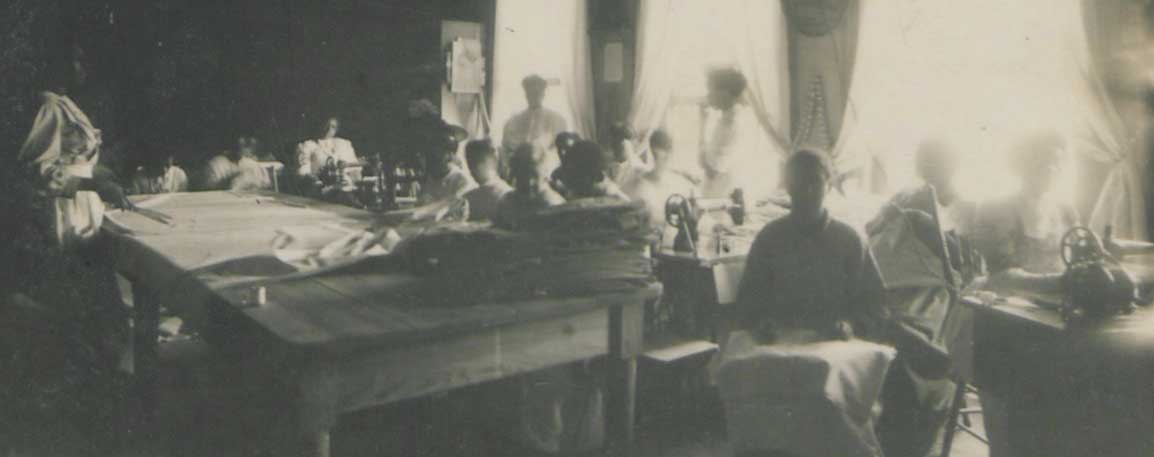
Patients often were made to do physical labor, such as washing laundry and working in the tobacco fields. There was constant struggle against poor facilities and overcrowding, which exacerbated outbreaks of dysentery, and measles. In the 19th century, common early diagnoses at CLACI included epilepsy, feeble mindedness, alcoholism, dementia, criminal insanity, and poor physical health.
Read the Transcript
Gentlemen,
Learning that the last meeting of your Board, to occur
during my connection with the asylum, will take place this
evening, I think it proper to present a brief report. I
shall make it very brief for the reason that I understand that
General Newberry will present to the Board a full and detailed
statement of every thing of interest relating to the Institution.
The asylum was established on the 17th December 1869 by order
of Major General Canby and at the same date I was assigned to its
charge. This arrangement continued until the State of Virginia was
admitted, when the Governor of the State assumed the position General Canby
previously occupied. Under this new condition I was continued in the
same position which I previously occupied up to the time of the
meeting of your Board, and by the action of your Board am to
remain in charge until the 1st July, prox. I deem it unnecessary to
refer to the changes that have taken place in the accommodations of
the asylum, as I understand General Newberry’s report will cover the
entire ground. The number of “Insane” at Howards Grove Hospital
at the date of the creation of the asylum was (72) Seventy two,
received since, (76) Seventy six making a total of (148) One hundred
and forty eight, who have been under treatment of this number, none
have been discharged (there being no authority for so doing) Ten,
(10) have died, leaving one hundred and thirty eight (138) at
the present time under treatment. It is proper that I should
state, that of those above enumerated as dead, only three (3)
have died from cerebral diseases, the other deaths occurring
from principally, old age and chronic diseases with which the
patients were suffering when admitted. It gives me pleasure to
present to the Board the list which is inclosed [sic] of patients in
this asylum whose condition I consider makes it proper that they
should be discharged at once. They have all had a long probation
since manifesting any symptoms of Insanity. A number of
these would have been discharged some time since, had there
been any authority for so doing.
The financial interests of the Institution have been managed
Entirely by General Newberry, and will undoubtedly be fully stated
in his report. I am happy to believe that there has been a very
marked improvement in the mental condition of a large major-
ity of the patients in the asylum, an improvement which is
becoming more and more evident every day. In the treatment
and management of the Insane, we have labored under many
difficulties owing to the crowded condition of the wards. (The
occupants being twice as many as they were intended to accom-
————Page 2/2————
modate,) also many of the appliances, used in the treatment of
Insane being wanting, we have been able by extra care in
regard to ventilation, cleanliness and exercise to avoid the
evils that might otherwise have occurred, owning to the
overcrowding. The patients are now in a very comfortable
condition, with the exception that their clothing is very
deficient, and a new supply seems absolutely necessary.
I think it proper to further state, that
there are now in, and supported by the asylum Ten (10)
Paupers who were turned over on the admission of the State
by the Freedmans Bureau, difficulty in disposing of these
persons has prevented their removal. In closing this
report it gives me great pleasure to testify to the ability,
energy and conscientiousness, with which the officers asso-
ciated with me have discharged their duties their course
in all respects, has been such as to meet my warmest app-
roval, expressing my thanks to the Board for their
courtesy extended me at their last meeting
I am
with much respect
Their obedient servant
JJ DeLamater,
Supt & Physician
Central Lunatic Asylum
The Town
On March 9, 1882, there was an overturn of the CLACI Board; a new one was instated by Governor Cameron, the Readjuster and former mayor of Petersburg. Former Confederate General Stith Bolling, now a Readjuster, was elected President of the Board. The board, which included Josiah Crump, a Captain who was in the Virginia Colored Volunteer Infantry, began investigating new hospital sites. New by-laws approved by the hospital board included regular inspections of the hospital and clear recordkeeping practices.
Later that year, the city of Petersburg purchased the Wilson Farm, which included 290 acres and the Mayfield Cottage, in Dinwiddie County for $15,000. The city then gave the property to the Commonwealth as the site for the new mental hospital for African Americans. In 1885, CLACI moved to its new permanent facility in Petersburg.
The major impetus for opening CLACI in Petersburg was the interest of the large black middle class of merchants, theologians, and politicians who resided in Pocahontas Island, a segregated community in the city. African American business and political leaders wanted to locate the hospital in Petersburg to be a part of the largest middle class black community in America. In addition, they were successful in obtaining legislative support for development of Virginia State College, the first public educational institution for African Americans in Virginia. The location of these two different public institutions represented both political and economic victories for blacks in Petersburg. Each institution was seen as a magnet for attracting both additional business to the area as well as highly skilled teachers, doctors, lawyers, and hundreds of laborers needed in the community.
Throughout its history, CLACI/CSH has been an integral part of the city of Petersburg and Dinwiddie County. The majority of the line staff throughout the hospital’s history was African American. A succession of black families provided service to the institution over its history. Besides being able to provide extensive employment opportunities in the Petersburg area, the hospital was a major contributor to the local revenue through purchases of goods and services.
Read the Transcript
The Supt. having concluded his report, the
Chairman read the following communication
which the secretary was instructed to enter upon
the record
Dr. J G Cabell
Prest. Of CLA
Dear Sir,
Your letter proposing on behalf
————Page 3/3————
of your Asylum to lease the property now occu-
pied by it for a term of five years has been received.
We respectfully decline to accede to the terms you
offer, and request that possession of the property
shall be given to us at the end of the present year,
in accordance with the express stipulations of the
lease made by Bacon Tait non decd.
The property was leased by Mr. Tait the State
of Virginia, while it was under the control of the
military officers of the United State for a merely
nominal rent because of seriously apprehension on
the part of Mr. Tait that it would be confiscated.
And the fact is, that while we have received only
$200 per annum rent we have been paying
annually that sum for the insurance of the Buildings
heretofore acknowledged to belong to us, and which
we now claim. We are anxious to bring our property
and its surroundings into the market as soon as
possible. We cannot do this so long as the Asylum
is upon it. Another objection to leasing it is that
some of the parties interested have conveyed their
interest to secure debts and the time for closing
this Deed is rapidly approaching.
Very Resplly
J Moore & Constance R his wife
CW Purcell by
HH Marshall their Ally
Isaac Davenport Jr. by
Chs N Williams his Ally
Read the Transcript
March 23, 1882
At a Meeting of the Board of Direc-
tors of the Central Lunatic Asylum, held
at Jarrett’s Hotel in the City of Petersburg
on Thursday the 23rd day of March
1882 held pursuant to adjournment.
Present
General Stith Bolling, President, in
the Chair. The same other members as
on yesterday and R. Bolling Willcox.The Board having completed this day
the examination of the various farms a-
bout and near the said City after lengthy
discussion selected as the site for the new
Asylum Buildings the Wilson Farm in
a westerly course from the said City
adjoining the lands of Dr. D. W. Lassiter
and others and containing 290 acres
and General Stith Bolling was selected by
the Board to communicate this fact to
the City Council of said City.As the second choice of the Board the
farm known as the Townshead farm ad-
joining the Wilson Farm and contain-
ing 100 acres was selected and
Messrs. Douglas Johnson and B. Taylor
McCue were appointed a Committee to
communicate this fact in the event of
failure on the part of the City aforesaid
to purchase the said Wilson farm.The Board whereupon adjoined to
meet at the Central Lunatic Asylum at
4 o’clock P.M. tomorrow.
Stith Bolling
President
Rise of Jim Crow South
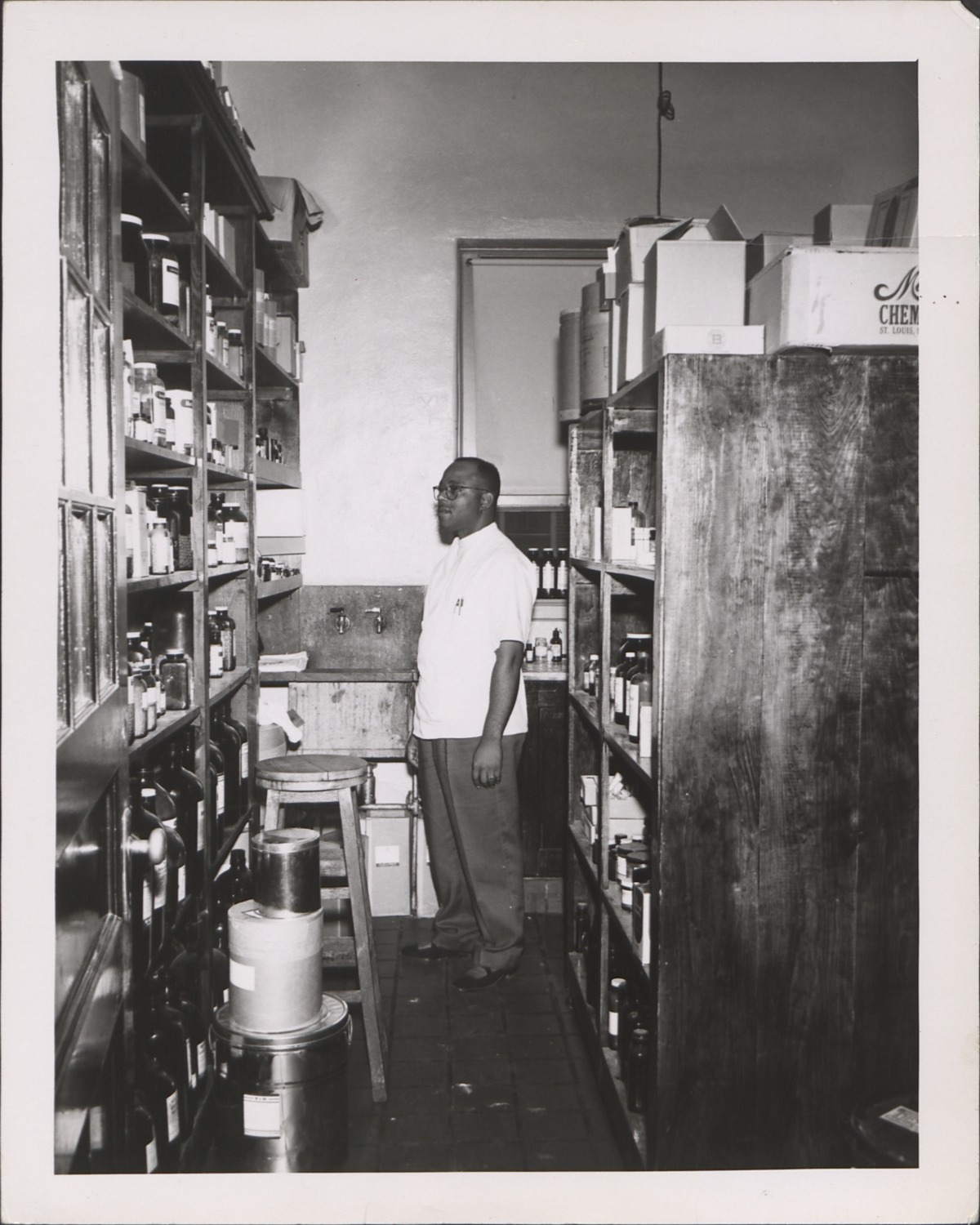
The Readjuster Party held a state legislative majority from 1879 until 1883. Afterward, the Virginia Democratic Party took over and established numerous Jim Crow laws that legalized segregation and disenfranchised African American Virginians. Then, in 1896, the Supreme Court’s decision in Plessy v. Ferguson allowed state-sanctioned segregation to continue in the Southern states. The supposed “separate but equal” doctrine lead to severe overcrowding and underfunding in state institutions such as Central State Hospital.
From 1870 to 1967, CLACI/CSH remained segregated by race and was the only hospital in the Commonwealth of Virginia that accepted African American mental patients from throughout the state. The hospital census doubled in size almost every decade, reaching a total of 5,000 patients by the 1950s. The Civil Rights Act of 1964 called for the end of segregation in public facilities. Starting in the spring of 1967, CSH was desegregated over a four-month period. At least one-half to two-thirds of incoming male and female patients during this time were from other Virginia state hospitals.
Maps
Additional Resources
Dain, Norman. (1971). Disordered Minds: The first century of Eastern State Hospital in Williamsburg, Va., 1766-1866. Williamsburg in America Series 8. Williamsburg, VA: Colonial Williamsburg Foundation; distributed by the University Press of Virginia, Charlottesville.
Drewry, William F. (1916). “Central Lunatic Asylum for the Colored Insane,” in Henry M. Hurd, ed., The Institutional Care of the Insane in the United States and Canada. Baltimore: Johns Hopkins Press.
Hartzell, Lawrence L. (1991). “The Exploration of Freedom in Black Petersburg, Virginia, 1865-1902,” in Ayers, Edward L. and Willis, John C., eds., The Edge of the South: Life in Nineteenth-Century Virginia. Charlottesville: University Press of Virginia.
Jackson, V. (1998). Separate and Unequal: The Legacy of Racially Segregated Psychiatric Hospitals. Substance Abuse, Mental Health Services Administration, US Department of Health and Human Services.
Noll, Steven. (1991). Southern Strategies for Handling Black Feeble-Minded: From Social Control to Profound Indifference. Journal of Policy History 3(2): 130–51. 93
Norris, Caroline. (2017). A History of Madness: Four Venerable Virginia Lunatic Asylums. Virginia Magazine of History and Biography 125(2): 138-182.
Pasamanick, Benjamin. (1964). The Myths Regarding Prevalence of Mental Disease in the American Negro: A Century of Misuse of Hospital Data and Some New Findings. Journal of the National Medical Association 56.
Randolph, K. (2003). Central Lunatic Asylum for the Colored Insane: A history of African Americans with mental disabilities, 1844—1885. Unpublished manuscript. http://repository.upenn.edu/dissertations/AAI3087454/
Swenson, Craig. (2017, May 17). Seeking Asylum. http://www.clarabartonmuseum.org/asylum/
